ANNUAL ACTIVITY IMPACT REPORT 2022
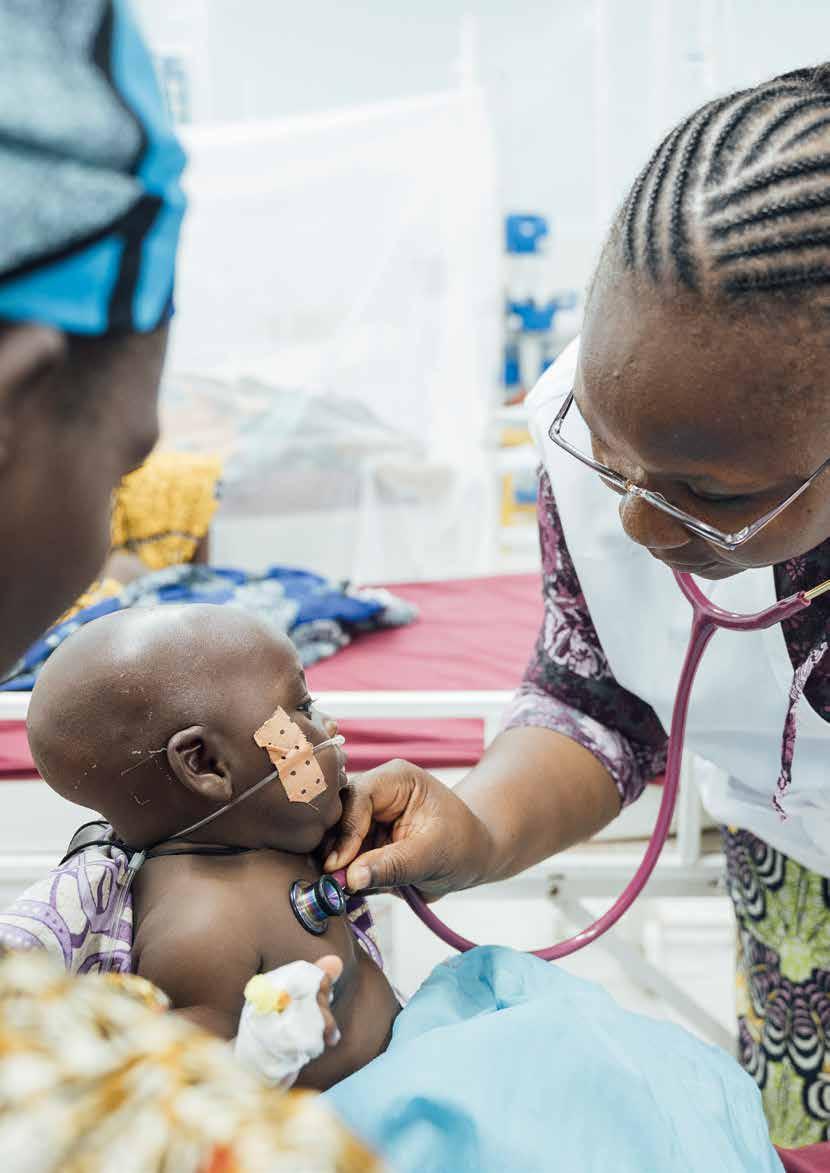 Médecins Sans Frontières Australia
Médecins Sans Frontières Australia
MSF officially launched medical activities in the equatorial Pacific island nation of Kiribati in October 2022. Our team there supports the Ministry of Health and Medical Services to improve maternal and neonatal health outcomes.
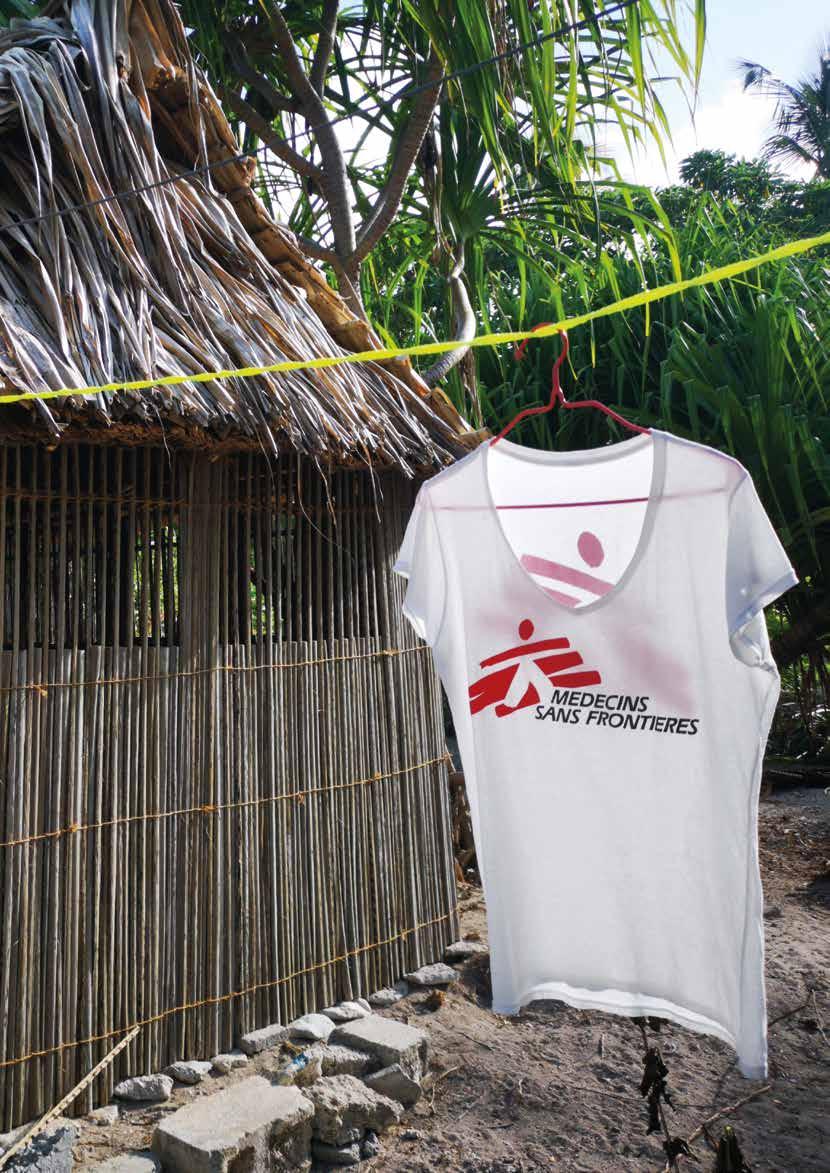 © MSF/Manja Leban
© MSF/Manja Leban
OUR CHARTER
Médecins Sans Frontières is a private international association. The association is made up mainly of doctors and health sector workers and is also open to all other professions which might help in achieving its aims. All of its members agree to honour the following principles:
Médecins Sans Frontières provides assistance to populations in distress, to victims of natural or man-made disasters and to victims of armed conflict. They do so irrespective of race, religion, creed or political convictions.
Médecins Sans Frontières observes neutrality and impartiality in the name of universal medical ethics and the right to humanitarian assistance and claims full and unhindered freedom in the exercise of its functions.
CONTENTS
Members undertake to respect their professional code of ethics and to maintain complete independence from all political, economic or religious powers.
As volunteers, members understand the risks and dangers of the missions they carry out and make no claim for themselves or their assigns for any form of compensation other than that which the association might be able to afford them.
3. MSF charter 4. Message from the President and Executive Director 6. Message from the Medical Unit 8. Australian and New Zealand project staff 10. MSF Australia and MSF New Zealand 2022 highlights 12. Projects funded by Australian and New Zealand donors 39. Financial report Front Cover: An MSF doctor consults with a mother and her four-month-old child in Madarounfa, Niger in October 2022. © Oliver Barth/MSF Médecins Sans Frontières Australia Annual Report 2022 – 3
MESSAGE FROM THE PRESIDENT

The year 2022 was a year of huge global and local shifts. While the world grappled with the escalation of war in Ukraine, we saw increasingly complex and protracted crises facing Afghans and the Rohingya people in Bangladesh.
Médecins Sans Frontières (MSF) Australia continued to support MSF’s global work in the ways we know best. We contributed considerable funding to MSF projects in 32 countries, enabled by our compassionate supporters, and supported the departure of 129 skilled and enthusiastic Australian and New Zealand project staff to work globally. We also provided direct operational support through our Medical Unit and regional partnerships.
A total of 24 Australian and New Zealand project staff contributed to MSF’s work caring for those affected by the devastating war in Ukraine in 2022. When the conflict dramatically escalated in February 2022, MSF teams rapidly increased our activities in the country. Our teams brought in relief supplies and medical equipment, and cared for war-wounded patients, including through providing mental health support.
MSF found ways to reach people despite the unpredictable situation and fastmoving frontlines, including through using specially designed medical trains to transport patients. Australian and New Zealand donors contributed to our work running mobile clinics in metro stations, where people took cover from indiscriminate bombing.
While the international spotlight, in many ways, remained on Ukraine, many other crises around the world did not receive the same attention.
In August 2022, Rohingya people living in refugee camps in Bangladesh’s Cox’s Bazar marked five years since more than 750,000 people of their community were forced out of Rakhine state, Myanmar, fleeing a violent, targeted campaign by the Myanmar military.
In Bangladesh, almost one million Rohingya refugees continued to live in limbo without durable solutions to their plight, in cramped and unsanitary
conditions and with crushing restrictions on their rights to move around the camps, as well as to be educated and to work. Those who sought safety by boat to Malaysia were forcibly returned to sea or were arrested, imprisoned or charged.
Australian and New Zealand donors helped fund our important work in the Cox’s Bazar camps, enabling MSF teams to provide basic and specialist healthcare for Rohingya patients. This included responding to concerning outbreaks of scabies and dengue affecting the community.
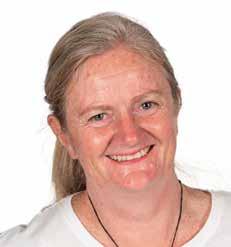
In Australia, we ran an awareness and advocacy campaign in August, urging the Australian government to issue targeted humanitarian visa allocations for Rohingya people. We also collaborated with Sydneybased artists from the Australian Rohingya Women’s Development Organisation who created a mural marking the five-year anniversary.
In Afghanistan, our supporters also funded MSF’s care with a focus on women and children. In 2022, Afghan people faced extreme hardship, including high levels of malnutrition as food prices soared. The Islamic Emirate of Afghanistan (the Taliban) continued to strip freedoms for women in the year since retaking power in the country. In December, edicts were issued restricting girls’ and women’s access to education, and banning female nongovernment organisation workers, with an informal exemption for those working in healthcare. While for now, we can retain women on our teams, MSF is deeply worried about the longer term, as female medical students cannot complete their education to become the doctors, nurses and specialists the country’s health system desperately needs.
The effects of the climate crisis are becoming increasingly visible globally, and it is disproportionally impacting the world’s most vulnerable people, including many of the communities with whom MSF works. In 2022, extreme weather events such as floods in Pakistan and cyclones in Madagascar required emergency responses to assist people’s access to healthcare.
In areas of the Sahel such as Chad and Nigeria, as well as in other places like
Katrina Penney President MSF Australia © MSF
Jennifer Tierney Executive Director MSF Australia © MSF
AND EXECUTIVE DIRECTOR
Yemen, factors such as droughts and bad harvests contributed to alarming levels of malnutrition among children, as did other factors such as collapsed health and economic systems, rising food prices and conflict. Worldwide, the volume of MSF’s malnutrition activities increased by 50 per cent from 2021 to 2022, yet there is insufficient global humanitarian action to meet malnutrition needs. Instead, MSF is witnessing global funding cuts, resulting in the downscaling of responses to this pressing crisis.
In 2022, MSF started working in Kiribati. The maternal and infant mortality rates in this Pacific Island nation are among the highest in the world, but there are insufficient maternal and child healthcare staff to meet the needs. Our project aims to improve maternal healthcare, particularly the diagnosis and treatment of diabetes, which is prevalent in the country.
At the beginning of 2022, as the pandemic entered its third year, MSF teams were still responding to COVID-19 in many places. While our response to COVID-19 decreased as the year wore on, our teams worked to address the toll the pandemic has taken on people and healthcare systems, such as a lack of routine vaccinations, which
has led to outbreaks of vaccine-preventable diseases in many countries.
In 2022, our supporters continued to have a global outlook, and continued to care, in the midst of some incredibly complex crises.
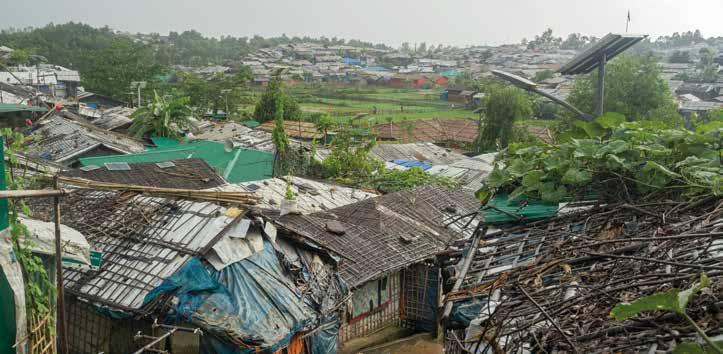
It is with your support that MSF continues to be able to reach and assist people facing crisis, regardless of who they are or where
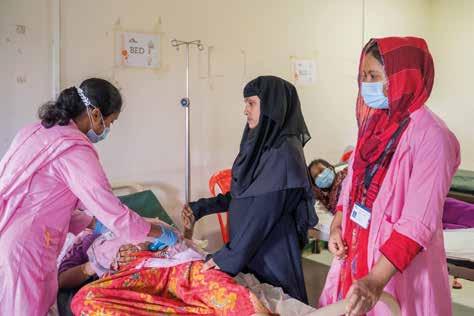
they are. Thank you for your generous and impactful commitment to global communities, and for your trust in us.
As we look forward, we are focused on improving the way we work with communities, and on ensuring everything we do is driven by an understanding of how our activities will improve people’s lives.
Shelters seen from a rooftop in the Cox’s Bazar camps in Bangladesh, where in 2022 Rohingya people marked five years of living in temporary shelters without proper access to healthcare, education or work. © Saikat Mojumder/MSF
Frontières Australia Annual Report 2022 – 5
A Rohingya woman in early labour is comforted by her female relative, while an MSF midwife monitors the baby’s heartbeat at the Goyalmara hospital in Cox’s Bazar, Bangladesh. © Saikat Mojumder/MSF
Médecins Sans
MESSAGE FROM THE MEDICAL UNIT
In 2022, the Medical Unit continued to provide support to MSF projects in the areas of women’s health, paediatric and neonatal care, nursing and sexual violence care.
Patient-centred care continued to be a high priority for MSF, as did investment in our nurses: the largest cohort of health providers in MSF. We also released some key results on abortion-related complications faced by women.
Patients and communities at the centre
MSF is traditionally a medical organisation, which means we have had quite a medical conception of disease. Yet patient-centred care is much more holistic than that: it considers the patient as someone with their own desires and needs, and as a person who is part of a community, rather than as an isolated patient with a disease.
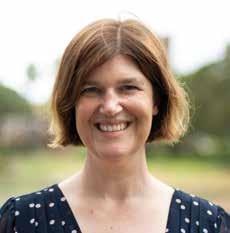
Moving towards a truly holistic understanding of the health needs of patients and communities, so that we can improve the way we work with them, relies on everyone across MSF.
supported by two diabetes nurses. We also started a pilot program for home glucose monitoring which will increase the agency and flexibility that children with diabetes and their parents have over their treatment.
In 2022 there were big increases in the number of people accessing sexual violence care in our projects in Binza, Bambu and Kibirizi, in the Democratic Republic of Congo, where our teams have developed community-based strategies to tackle sexual violence. These increases suggest initial success in overcoming some of the barriers that survivors in these areas of DRC face to accessing care. Community-based approaches to sexual violence ensure better development of models of care that are appropriate for the specific community, and that are centred on victim-survivors’ needs.
Safe abortion care
Head
In 2022, the Medical Unit ran an important training for the MSF Australia office, to engage staff to better understand patient-centred care, what it looks like when developed and practiced in MSF projects, and how office staff can better centre patients in the work they do—whether in fundraising for our operations, communicating about and advocating for the needs of patients, or recruiting project staff to work with MSF.
At the project level, we continued to see the value of patient-centred care. Children under 15 years of age make up more than 60 per cent of patients in MSF projects, and many arrive at our facilities critically unwell and in need of urgent lifesaving care. In paediatric programs in 2022, while hospital care remained a focus, there was increased attention on providing healthcare in the community to keep children healthier and prevent serious illness.
This is particularly important in chronic disease care. In Aweil in South Sudan, we supported the implementation of a chronic care program for children with diabetes, where patients can receive outpatient treatment and follow-up
Abortion-related complications are one of the five main causes of maternal mortality. However, research about abortion is very limited in fragile and conflict-affected settings. In our 2021 Annual Activity Impact Report, I shared with you the MSF research project into abortion-related morbidity (illness) and mortality (death), the AMoCo study. The study aims to describe the magnitude and severity of abortion-related complications for patients in two MSF-supported referral hospitals in such settings, in northern Nigeria and the Central African Republic.
In 2022 we released our results. The data gained from the study data suggests high severity of abortion-related complications in the two referral hospitals, with possible contributing factors being greater delays in accessing post-abortion care, decreased access to contraceptive and safe abortion care that result in unsafe abortions, and increased food insecurity likely leading to iron deficiency and chronic anaemia. Our results highlighted the need for better access to safe abortion care, contraception and high quality postabortion care to prevent and manage
Dr Claire Fotheringham
of Medical Unit MSF Australia
© Victor Caringal
complications of abortion in fragile and conflict-affected settings.
Investments in nursing
Nurses are often the first and only point of contact for patients seeking care and spend more time at the bedside than any other profession. Investing in them will see the greatest rewards for patients. In 2022, we carried out a survey among our nurses to collect their feedback and the challenges they face regarding their nursing practice, with the aim to improve the vision, understanding and support of nursing— which has the important flow-on impact of greater quality care for patients.
The Operational Centre Paris nursing team overcame decreased capacity in the first half of the year to become a diverse and specialised team of four, covering four areas of nursing care: paediatric and neonatal, adult, operating theatre and burns care. This reflects a strong investment in the development of evidence-based nursing procedures and resources, and also the direct support that our advisors provide to staff in MSF projects globally.
In 2023, our priorities will include progressing a multidisciplinary approach to pain management via workshops and development of visual tools, as well as continuing to build quality assurance systems in nursing care.
2022: OUR SUPPORT IN NUMBERS
Goodbye for now
On a personal note, I would like to take this opportunity to express my gratitude as I finish up 12 years of work with MSF— including four years as head of the MSF Australia Medical Unit.
From my first day on assignment as a doctor with MSF, working in a 205-bed women’s and children’s hospital in Sierra Leone, to leading a formidable and truly global Medical Unit, I have had the honour to work with some incredible colleagues. I have seen the work they put in every day to centre patients and drive change to deliver quality care that matters.
It has been a privilege to connect and learn from many patients and other community members in the projects in which I’ve worked and visited, and to have gained a greater understanding of how MSF can meet them where they are.
Lastly, to our supporters—thank you for the many great conversations, and for your deep engagement and trust in the work we do. It’s been incredibly motivating to know we have your support, and to see the care that can be achieved together.
Dr Claire Fotheringham Head of Medical Unit MSF Australia
139,000 antenatal and 32,000 postnatal care consultations
42,700 births assisted
4,500 patients provided with safe abortion care
9,500 neonatal admissions
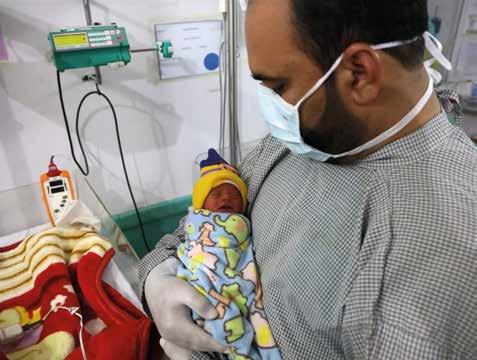
1.2 MILLION paediatric outpatient consultations
6,600 victim-survivors of sexual violence treated
An MSF nurse holds a newborn baby at MSF’s women’s hospital in Peshawar, Pakistan. © Nasir Ghafoor/MSF
A snapshot of the activities across projects supported by the Medical Unit.
Médecins Sans Frontières Australia Annual Report 2022 – 7
AUSTRALIAN & NEW ZEALAND PROJECT STAFF IN 2022
This is a comprehensive list of all professions from Australia and New Zealand who departed to work in MSF projects in 2022. Our staff filled 129 departures during the year, contributing to an international workforce of more than 44,000 staff (full-time equivalents).
AFGHANISTAN Paediatrician
Field Coordinator Nurse Doctor Doctor Nurse Nurse
Anaesthetist
HR Officer
Surgeon
ARMENIA Logistician
BANGLADESH Logistician
Head of Mission
Paediatrician Nurse
Midwife
CENTRAL AFRICAN REPUBLIC
HR Officer
Field Coordinator
CHAD
HR Officer
Epidemiologist
EGYPT
Mental Health Coordinator
ETHIOPIA Midwife
HAITI Doctor
Theatre Nurse Nurse Psychologist Doctor
Doctor
Anaesthetist Doctor
KENYA Psychiatrist Logistician
KIRIBATI Paediatrician
Midwife Logistician Logistics Team Leader Midwife Administration
Logistician Doctor
Head of Mission Doctor Doctor
LEBANON Logistician
LIBERIA Pharmacist Logistics Team Leader
MYANMAR
Assistant Head of Mission
NIGERIA Epidemiologist Assistant Head of Mission Logistics Coordinator
PAKISTAN Mental Health Coordinator Nurse
Field Coordinator Medical Coordinator
PALESTINE Surgeon Health Promotion Doctor
PAPUA NEW GUINEA Doctor Nurse Logistics General Doctor
PHILIPPINES Medical Coordinator
POLAND Head of Mission Nurse
SEARCH AND RESCUE OPERATIONS Doctor
SIERRA LEONE Logistics Team Leader
SOMALIA Nurse
SOUTH SUDAN Nurse Nurse
Logistician Doctor
Anaesthetist Doctor
Anaesthetist
Communications Officer Nurse
Paediatrician Doctor Midwife Nurse
SUDAN Logistician
Pharmacist
SYRIA Field Coordinator
Medical Scientist
THAILAND
Mental Health Coordinator
UGANDA Logistician HR Officer Doctor
Logistics Coordinator
Field Coordinator
Psychologist
Medical Coordinator
UKRAINE Nurse
Field Coordinator Nurse
Nurse
Doctor
Field Coordinator
Assistant Head of Mission Nurse
Psychologist Nurse
Medical Team Leader
Logistician
Finance Officer
Medical Coordinator
Mental Health Coordinator
Field Coordinator
Medical Coordinator
Medical Team Leader
Info/Legal Officer Nurse
Nurse
Doctor
HR Officer Nurse
VARIOUS (TRAINING)
Doctor
VARIOUS LOCATIONS
Admin-Finance Coordinator
YEMEN
Logistician
Midwife Nurse Nurse Nurse
Info/Legal Officer
Field Coordinator
Midwife
Admin-Finance Coordinator
Admin-Finance Coordinator Doctor Doctor
This list of field workers comprises only those recruited by MSF Australia. We also wish to recognise other Australians and New Zealanders who have contributed to MSF programs worldwide but are not listed here because they joined the organisation directly overseas.
MSF team boards a plane in Tarawa to travel to the outer islands of Kiribati, where we support the Ministry of Health and Medical Services to improve maternal and neonatal health outcomes, through skills development and training, implementation of guidelines, case management and infrastructure upgrades. ©
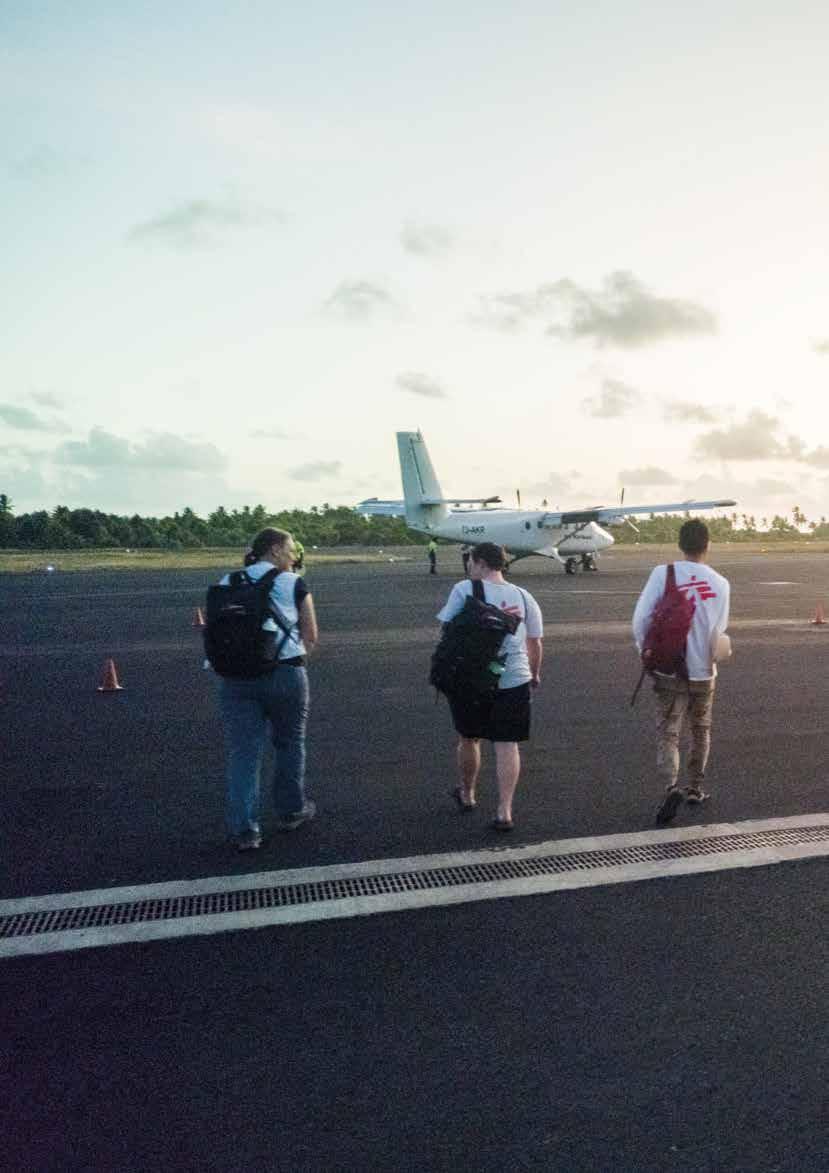
– 9
The
Manja Leban/MSF
Médecins Sans Frontières Australia Annual Report 2022
MSF AUSTRALIA AND MSF NEW ZEALAND HIGHLIGHTS 2022
*‘Paramedical’ includes all health professionals who are not doctors. In 2022, MSF Australia supported 129 departures of professionals from Australia and New Zealand, to 33 countries.
The 2022 income of MSF Australia and MSF New Zealand totalled $108.3 million. Of this, $100.7 million was generated from fundraising activities. This is a 4 per cent decrease from 2021 fundraising income and represents continued generous support from the Australian and New Zealand public.
Approximately 127,216 Australians and New Zealanders participated in the Field Partner program in 2022, contributing on a monthly basis to MSF Australia and MSF New Zealand, and another 48,669 Australians and New Zealanders provided occasional gifts.
3.4% 1.3% Field Human Resources Non-medical support staff 36% Paramedical* 34% Medical 30%
Income AUD Field Partners 50.5% 54,681,590 Bequests 11.6% 12,510,829 Major Donor Income 10.0% 10,803,107 Online Donations 10.0% 10,844,632 General Appeals 6.2% 6,738,297 Income from other MSF sections 6.1% 6,631,721 Trusts and Foundations 3.4% 3,665,938 Other Fundraising Income 1.3% 1,441,306 Other Income 0.9% 980,181 Total 100% 108,297,599
34% 30% 36% 0.9% 50.5% 11.6% 10.0% 10.0% 6.2% 6.1%
Spending on our social mission was 72.4 per cent of total expenditure, which is 2.8 per cent lower than in 2021. Consistent with previous years, this was split between projects run by Operational Centre Paris and Operational Centre Geneva.
Our investment policy within Australia remains consistent with previous years. Short term deposits are used to maximise interest, minimise risk and ensure flexibility and accessibility of funds when required.
MSF Australia continues to rely on the generous support of both our project staff and office volunteers. The estimated total salaries forgone by project staff for 2022 was $2.02 million (compared to $2.1 million in 2021) and for office volunteers, $42,390 (compared to $56,700 in 2021). Additionally, the Board of Directors (except for the President who receives a partial salary) and Association members also freely gave their time to MSF. The estimated value of the time provided by the Board and the Members was approximately $502,000 (compared to $425,000 in 2021). In 2021, $660,000 was spent on the Southeast and East Asia and Pacific (SEEAP) project (compared to $613,000 in 2021).
3.8% 1.4% 3.4% 2.3% Spending by region Africa 56.8% Asia 32.3% The Americas 3.8% Europe 2.3% Oceania 3.4% Other 1.4% Total 100%
Finance AUD 2022 2021 Donation Income 100.69 105.53 Other Income 7.61 7.30 Total Income 108.30 112.84 Social Mission Costs 81.90 78.17 Fundraising Costs 22.64 19.93 Management and General Administration Costs 8.55 5.79 Total Costs 113.09 103.90 Surplus (4.79) 8.94 Equity 15.35 20.14 ($m) ($m) 56.8% 32.3%
Médecins
Frontières Australia Annual Report 2022 – 11
Sans
PROJECTS FUNDED BY AUSTRALIAN AND NEW ZEALAND DONORS
In 2022, MSF ran medical humanitarian projects in more than 70 countries. Australian and New Zealand donors supported work in 32 of those countries. MSF projects are run by six operational centres (Amsterdam, Barcelona/Athens, Brussels, Geneva, Paris and West and Central Africa). The Australian section is a partner of the Paris and Geneva operational centres, and Australian and New Zealand donors contribute funding to projects run by both Paris and Geneva. Australian and New Zealand staff work in projects run by all operational centres.
Received AU and NZ funding
Received funding from other MSF Offices
TOP-FUNDED COUNTRIES IN 2022
Based on funding by Australian and New Zealand donors
YEMEN $5,608,845
NIGER $5,000,000
SOUTH SUDAN $4,235,925
SUDAN $3,718,535
BURKINA FASO $3,088,235
32 1 10 29 32 31 11 24 15 17 18 3 19 4 5 27 6 28 16 7 20 21 22 23 12 30 8 9
STAFF NUMBERS IN 2022
Top-supported countries based on the number of Australian and New Zealand staff departures
UKRAINE 24 KIRIBATI 11
SOUTH SUDAN 13 AFGHANISTAN 10
YEMEN 12
FUNDING FROM AUSTRALIAN AND NEW ZEALAND DONORS
All figures are in Australian dollars.
*Includes support for the MSF Academy for Healthcare, SEEAP Supply and Climate Smart (see page 37) through other operational centres and partner sections.
Médecins Sans Frontières Australia Annual Report 2022
2 25 26 13
Country MSF Paris MSF Geneva 1. Afghanistan 807,303 2. Bangladesh 2,038,540 3. Burkina Faso 588,235 2,500,000 4. Cameroon 2,000,000 5. Central African Republic 1,764,706 6. Chad 1,395,337 7. Democratic Republic of Congo 1,764,706 8. Haiti 1,764,706 9. Honduras 800,000 10. Iraq 2,505,000 11. Jordan 2,352,941 12. Kenya 1,176,471 500,000 13. Kiribati 586,207 14. Lebanon 1,866,126 15. Liberia 1,764,706 16. Libya 588,235 17. Madagascar 1,176,471 18. Malawi 2,547,688 19. Mali 1,764,706 20. Mozambique 1,500,000 21. Niger 2,000,000 3,000,000 22. Nigeria 2,352,941 684,662 23. Pakistan 1,781,017 24. Palestine 2,352,941 25. Papua New Guinea 1,764,706 26. Philippines 941,176 27. South Sudan 2,352,941 1,870,484 28. Sudan 1,764,706 1,944,829 29. Syria 1,764,706 30. Uganda 1,764,706 31. Ukraine 1,577,842 32. Yemen 3,488,845 2,120,000 TOTAL 47,267,385 20,011,182 OTHER PROJECTS* 954,581 OVERALL TOTAL 68,233,148
“Children under 15 years of age make up more than 60 per cent of patients in MSF projects... in 2022 there was increased attention on providing healthcare in the community to keep children healthier and prevent serious illness.”
– Dr Claire Fotheringham, head of the Medical Unit, MSF Australia
– 13
PROJECTS FUNDED BY AUSTRALIAN AND NEW ZEALAND DONORS
This section describes those projects supported by the generous donations made to MSF Australia and MSF New Zealand in 2022. Yemen, Niger, South Sudan, Sudan and Burkina Faso were the top-funded countries in 2022, and these pages are followed by all other projects funded by Australian and New Zealand donors. For a complete record of MSF’s global work in 2022, including projects funded through other MSF sections, please visit www.msf.org/resource-centre.
KEY
KEY ACTIVITIES
refers to the types of care provided by MSF teams in the country in 2022.
IMPACT
highlights a primary achievement of MSF teams in the country in 2022, thanks to our supporters.
PROJECT STAFF
refers to the number of full-time equivalent staff in projects run by Operational Centre Paris and Operational Centre Geneva in 2022.
TOTAL FUNDING
refers to the total cost of the projects described in the country description for 2022 (projects run by Operational Centre Paris and/ or Operational Centre Geneva). All amounts are in Australian dollars.
AU FUNDING
refers to MSF Australia supporters’ contribution to the country’s projects in 2022. All amounts are in Australian dollars.
NZ FUNDING
refers to MSF New Zealand supporters’ contribution to the country’s projects in 2022. All amounts are in Australian dollars.
The maps and place names used in this report do not reflect any position by MSF on their legal status.
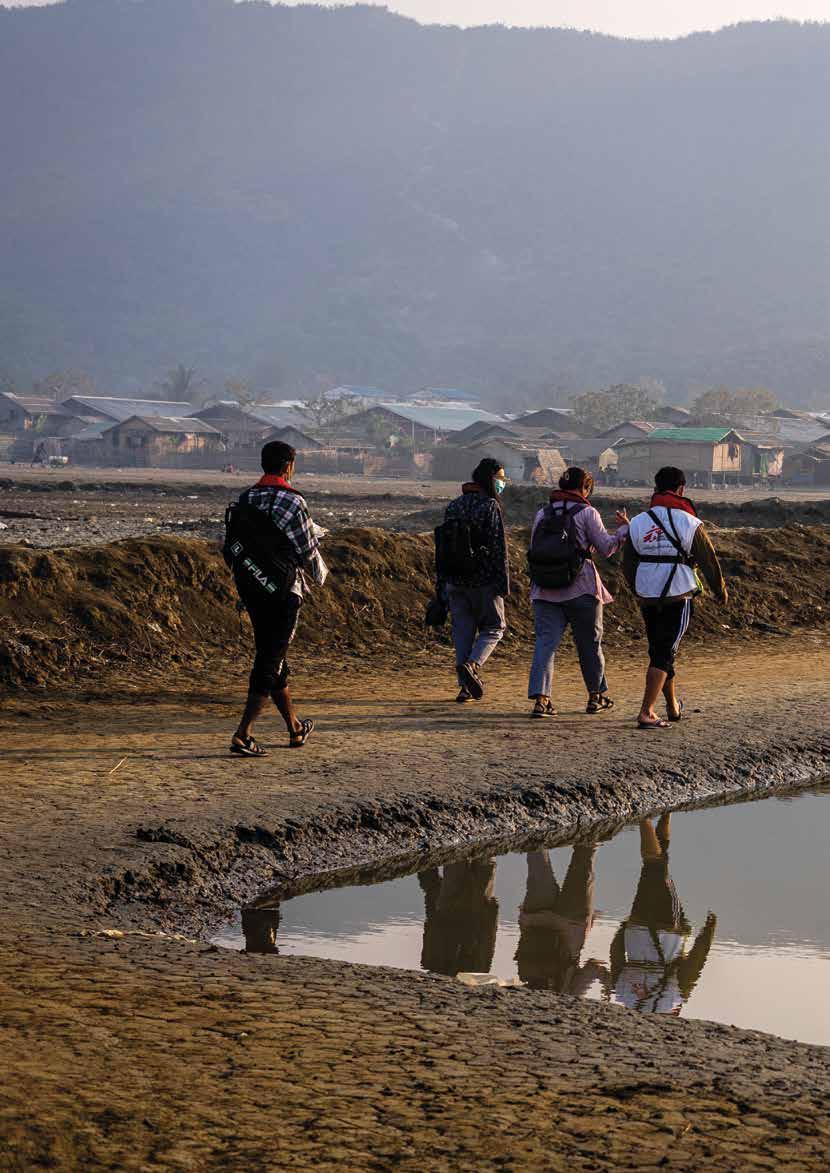 MSF staff walk towards Paukaw township to set up a clinic where they will provide medical and mental healthcare for displaced people in Ah Nau Ywe camp. Myanmar, March 2022. © Ben Small/MSF
MSF staff walk towards Paukaw township to set up a clinic where they will provide medical and mental healthcare for displaced people in Ah Nau Ywe camp. Myanmar, March 2022. © Ben Small/MSF
BURKINA FASO
The security situation continued to deteriorate in Burkina Faso in 2022, as conflict between the government and non-state armed groups intensified.
The fighting caused waves of displacement and exacerbated the already dire medical needs. Many cities were besieged by armed groups, sometimes forcing MSF to suspend or cease activities altogether.
After armed groups took control of Djibo, where our teams were supporting basic healthcare, surgery and nutrition, as well as the provision of water, land access soon became virtually impossible. Food and medical supplies could only be delivered by military convoys or by air, causing severe shortages and a steep rise in prices. Health facilities in the country also faced staff shortages as many medical professionals fled the violence. Threats against our staff and patients, increased checkpoints and restrictions on our supply lines by armed groups forced us to close projects in CentreNord and Sahel regions during the year.
Nevertheless, our teams continued to deliver humanitarian and medical assistance to displaced people and host communities in the Centre-Nord towns of Barsalogho, Kaya and Djibo, and in Dédougou, Tougan and
Nouna in the Boucle du Mouhoun district, focusing on tackling major health issues, including malaria, outbreaks of measles and other infectious diseases, mental health and sexual violence, and supporting access to community-based basic and specialist healthcare.
A significant proportion of the consultations were carried out by community health workers, whom MSF has trained to treat the most common diseases and conditions, such as malaria, diarrhoea and acute respiratory infections. Our teams also trucked in water and constructed and renovated boreholes to address the severe water shortage, which has been compounded by the ongoing conflict. In Kaya, MSF provided medical and humanitarian assistance with a mobile clinic and the distribution of non-food item kits to internally displaced people at the regional stadium, which became an openair camp, where people slept out unsheltered and were exposed to respiratory and diarrheal diseases and malaria.
Project locations funded by Australian donors
IMPACT:
Implementation of medical care activities for victims of sexual violence in Dédougou.
PROJECT STAFF: 324
FUNDING: TOTAL $14,949,189
AU $3,088,235
Basic healthcare, malaria care, mental health, nutrition, sexual violence care, surgery
Mariam, an internally displaced person in Kaya: “When it is raining, we have to sleep under plastic tarpaulin with my grandsons, because we do not have adequate shelters.” © MSF/ Mohamed El-Habib Cisse
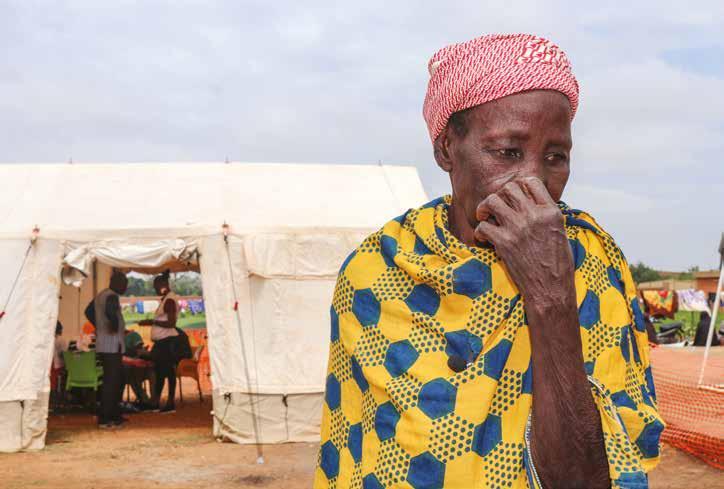
CENTRE-NORD
BOUCLE DU MOUHOUN KAYA DJIBO
KEY ACTIVITIES Médecins Sans Frontières Australia Annual Report 2022 – 15
NIGER
MSF ran a range of projects in Niger to address the significant health needs caused by conflict, displacement, food insecurity, epidemics and other factors.
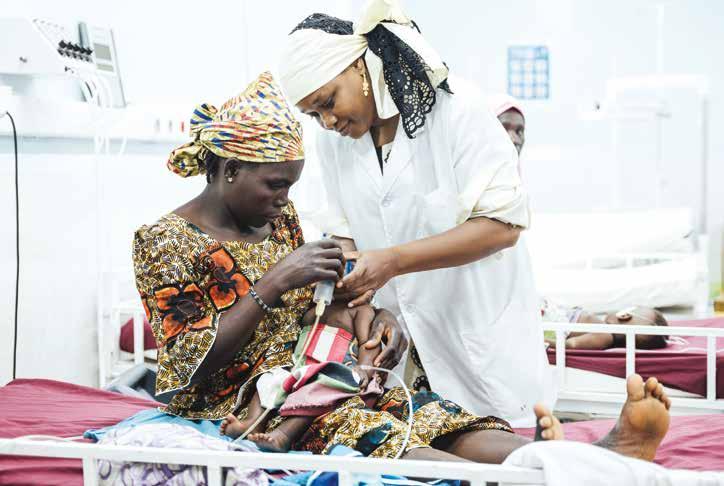
In 2022, our teams carried out mass vaccination campaigns, distributed drinking water and relief items, such as hygiene and cooking kits, constructed shelters and ran mobile clinics for displaced people in Tillabéri region.
In Zinder region, the combination of an early malaria peak and a poor agricultural season led to a significant increase in the number of paediatric patients. To boost inpatient capacity in Magaria, we constructed two observation rooms in Tinkim and Yékoua health centres.
As well as treating patients in our paediatric unit, we continued to develop preventive and community-based approaches to care to reduce the number of patients with complications from malnutrition, for example training community members to provide treatment for simple cases of common illnesses such as malaria, acute respiratory infections and diarrhoea. A total of 173,590 consultations were conducted by MSF-trained community members in 2022.
We also supported the health authorities’ responses to outbreaks of disease in Zinder region, vaccinating 653,420 children against measles and 257,078 against meningitis.
In Madarounfa hospital and in five health areas in Maradi region, we offered medical and nutrition care to children with malnutrition, malaria and other childhood diseases. As a result of our partnership with the health authorities and the World Food Programme, dedicated to treating children with moderate acute malnutrition, the number of hospital admissions for malnutrition was the lowest in four years.
In Madarounfa district, we provided care for children with sickle cell disease, which included vaccinations, antibiotics to prevent and treat infections, pain medications and blood transfusions. To better prevent and manage severe complications of the disease, we introduced treatment with hydroxyurea, a drug listed by the World Health Organization as essential for haemoglobin diseases in children but still difficult to access in Niger.
Project locations funded by Australian donors
IMPACT: 16,688 children under the age of five admitted for care at Magaria paediatric unit.
PROJECT STAFF: 524
FUNDING:
TOTAL AU
$25,595,950 $5,000,000
KEY ACTIVITIES
Chronic disease care, nutrition, malaria care, measles care, vaccinations
MADAROUNFA
TILLABERI ZINDER
A mother holds her four-month-old child as a nurse attends to him in the Madarounfa hospital. © Oliver Barth/MSF
MALNUTRITION IN MADAROUNFA
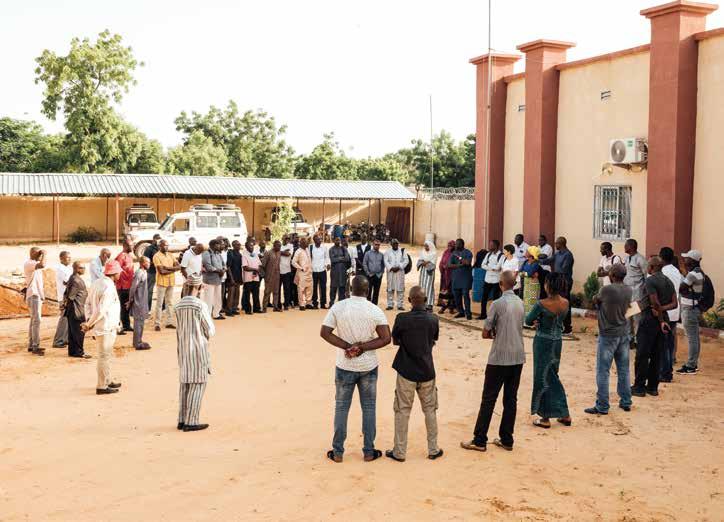
“I brought my youngest son here because he is severely malnourished,” says Maraliyya Garba. Her son was admitted to the intensive care unit for treatment of malnutrition and associated medical complications, with the expectation he would be in hospital for 10 days.
Malnutrition is a recurring crisis in Niger. The reasons for this are complex: the increasing drought in the Sahel is making agriculture difficult, and the spread of desert combined with population growth means that receding fertile land will need to support more and more people.
In addition, extreme weather events are occurring with increasing frequency and repeatedly destroying harvests. Speculation on the food market also means that food is becoming scarce or simply too expensive. The direction of international aid towards other crises also plays a role.
The violence in the region is also a cause of malnutrition: people are fleeing armed groups such as Boko Haram or the so-called Islamic State, or no longer dare to till their fields because of the major risk of being attacked or kidnapped. Maraliyya Garba and her husband say they are too fearful to work their fields for this reason, following the abduction of one of their daughters.
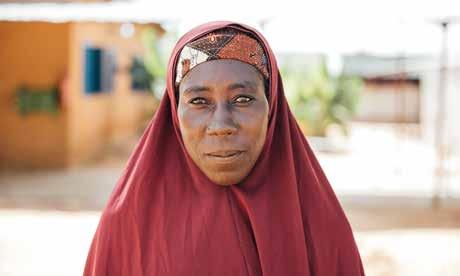
Maraliyya Garba is a farmer from Totsa, a village north of Madarounfa where MSF supports the hospital with medical and nutrition care for children.
© Oliver Barth/MSF
Médecins Sans Frontières Australia Annual Report 2022 – 17
The morning team meeting at Madarounfa hospital, Niger. © MSF/Mohamed El-Habib Cisse
SOUTH SUDAN
More than two-thirds of people in South Sudan were in need of humanitarian assistance in 2022.
Communities continued to suffer the consequences of recurrent violence, poor access to healthcare, economic instability and a fourth consecutive year of disastrous flooding. Substantial cuts were also made to international aid during the year.
In Abyei, a disputed area between Sudan and South Sudan, MSF’s 180-bed hospital in Agok town continued to offer surgery, neonatal and paediatric care, treatment for snakebites, care for people living with HIV and tuberculosis, diabetes treatment and care for malaria until February, when violent clashes broke out in the community and caused residents to flee their homes.
Our teams followed displaced people— mostly women and children—to Abyei town and Twic county, to provide medical assistance. One of MSF’s South Sudanese nurses from Agok hospital was killed inside his home during these clashes.
In Aweil, MSF continued working in Aweil State Hospital (a Ministry of Health facility), supporting maternal and child healthcare and running an outpatient clinic for children with diabetes.
We also supported a ‘test-and-treat’ centre for malaria, attached to the hospital’s outpatient department, with the aim to reduce the incidence of severe malaria during the peak season. This approach mostly relies on the use of rapid diagnostic tests. Our teams carried out outreach activities providing seasonal malaria chemoprevention and seasonal support for malaria care to three outpatient facilities.
After decades of conflict, severe shortages of both health infrastructure and qualified medical professionals in South Sudan continue to pose major challenges to the development of a good healthcare system in the world’s youngest nation.
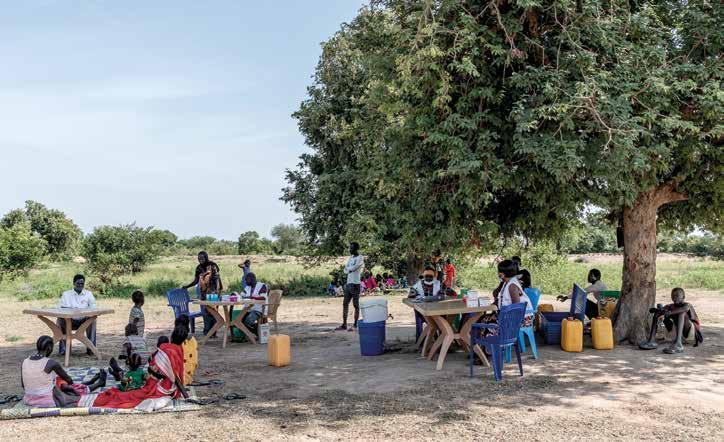
Founded in 2017, the MSF Academy for Healthcare is a training initiative designed to strengthen the professional development of locally hired MSF health workers and improve the quality and continuity of care provided in MSF projects. It is currently running in several countries across subSaharan Africa.
In June 2022, the first group of 35 nursing students in Old Fangak, Jonglei state, graduated after completing 18 months of nursing care training.
Project locations funded by Australian donors
IMPACT:
‘Test-and-treat’ for malaria was introduced in three primary healthcare centres during the peak malaria season.
PROJECT STAFF: 629
FUNDING: TOTAL AU $27,556,423 $4,223,425
KEY ACTIVITIES
An MSF team sets up a distribution site for seasonal malaria chemoprevention in a village in Aweil. © Adrienne Surprenant
Diabetes care, maternal healthcare, malaria response, neonatal care, paediatric care, snakebite treatment, staff professional development.
AWEIL
ABYEI AGOK OLD FANGAK
THE ACADEMY FOR HEALTHCARE: “I’VE SEEN THE IMPACT THE TRAINING HAS MADE.”
MSF works in remote areas with marginalised communities. With limited qualified health staff in these areas, MSF provides on-thejob training for people so that they can carry out medical interventions safely. The MSF Academy aims to professionalise and formalise this training. We engage tutors who are qualified and have experience in both mentorship and tutorship.
ensure that classes have started. I also visit the hospitals to see how the medical tutors are integrating with the rest of the team, while supporting the clinical mentors in their dayto-day activities in the wards.
Being passionate about my career as a nurse, and wanting to utilise my nursing skills for the benefit of humanity, led me into humanitarian work.
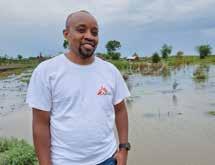
In 2019, I was fortunate to get a job with the MSF Academy for Healthcare. I was in charge of implementing the Basic Clinical Nursing Care curriculum for nurses and midwives. Since then, I have worked with MSF in many locations in South Sudan, including Juba, Old Fangak, Bentiu and Malakal.

The MSF Academy is like a college within a project. We have classrooms, bedside teaching and a pool of staff working as tutors, whom I supervise and mentor. Since joining the MSF Academy, I’ve seen the impact the training has made on our healthcare staff and the patients we care for by improving the quality of care we provide.
Despite working within a hospital setting, we run the MSF Academy just like any other learning institution. On a normal day, I go to the classrooms to make sure that tutors are ready and go through the session plans to
One of the things that I’m most happy with is seeing how the MSF Academy helps improve things in the facilities where we work, and at the same time empowering our learners. My most proud moment was in early June [2022] when the first cohort of students graduated in Old Fangak. That’s when I realised the magnitude and impact of the training we have been offering. It was even more fulfilling seeing the community celebrate and support the graduates.
As a nurse educator, I’m now more motivated to transfer and share my knowledge and skills with upcoming nurses so that they are able to give better care to their patients and help save lives.
Wilson Thiongo is a nurse educator with the MSF Academy for Healthcare in South Sudan.
Médecins Sans Frontières Australia Annual Report 2022 – 19
The Academy for Healthcare graduation ceremony for nursing students in Old Fangak. © Florence Miettaux
SUDAN
MSF continued to respond to multiple health issues during a turbulent year in Sudan, where violence and extreme weather caused mass displacement.
In 2022, humanitarian needs in the country were at their highest levels in a decade, amid conflict, erratic rainfalls, flooding, food insecurity, funding cuts and an ongoing political and economic crisis.
There was a surge in fighting between fragmented armed groups in Darfur, Kordofan and Blue Nile states, causing further displacement. According to United Nations estimates, more than 3 million people were displaced across the country, including around 400,000 people newly displaced in 2022. About 2.5 million of them were in Darfur.
In West Darfur, we continued to run a range of medical services in the city of El-Geneina, including basic and emergency healthcare, sexual and reproductive healthcare, health promotion and laboratory support.
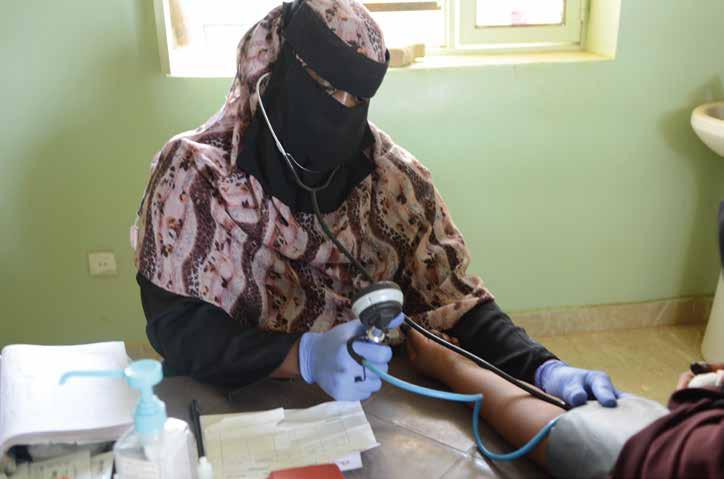
In Khartoum and Omdurman, MSF offered general healthcare and emergency services
for refugees, displaced people and local communities, with a focus on maternal healthcare. Our teams conducted an increased number of antenatal consultations during the year compared to in 2021.
We ended our support to Mygoma orphanage in Khartoum in December and handed over to the Ministry of Social Development and the Ministry of Health. Our activities included running a 15bed medical clinic to treat sick children, providing physiotherapy and mental health support, referring patients requiring specialised care to private hospitals and rehabilitating residential rooms and electricity.
In Kassala state, our teams assisted Ethiopian refugees and local communities by offering basic healthcare, sexual and reproductive healthcare, nutrition support for children and treatment for neglected tropical diseases.
Project locations funded by Australian and New Zealand donors
IMPACT:
11,208 antenatal consultations provided in Khartoum and Omdurman.
PROJECT STAFF: 210
FUNDING: TOTAL AU $30,296,135 $2,973,706 NZ $747,395
KEY ACTIVITIES
Basic healthcare, emergency care, maternal healthcare, nutrition, sexual and reproductive healthcare.
A midwife assistant takes the blood pressure of a patient at an MSF mobile clinic in Omdurman. © Majd Aljunaid/MSF
KASSALA KHARTOUM WEST DARFUR
“We see that people here are interested to know more about different health topics through their interaction and questions during the sessions we hold. This makes us more determined to pass the right messages and contribute to containing diseases and helping the community,” says Fatima Az Zahara Abdulrahman, MSF health promoter in the
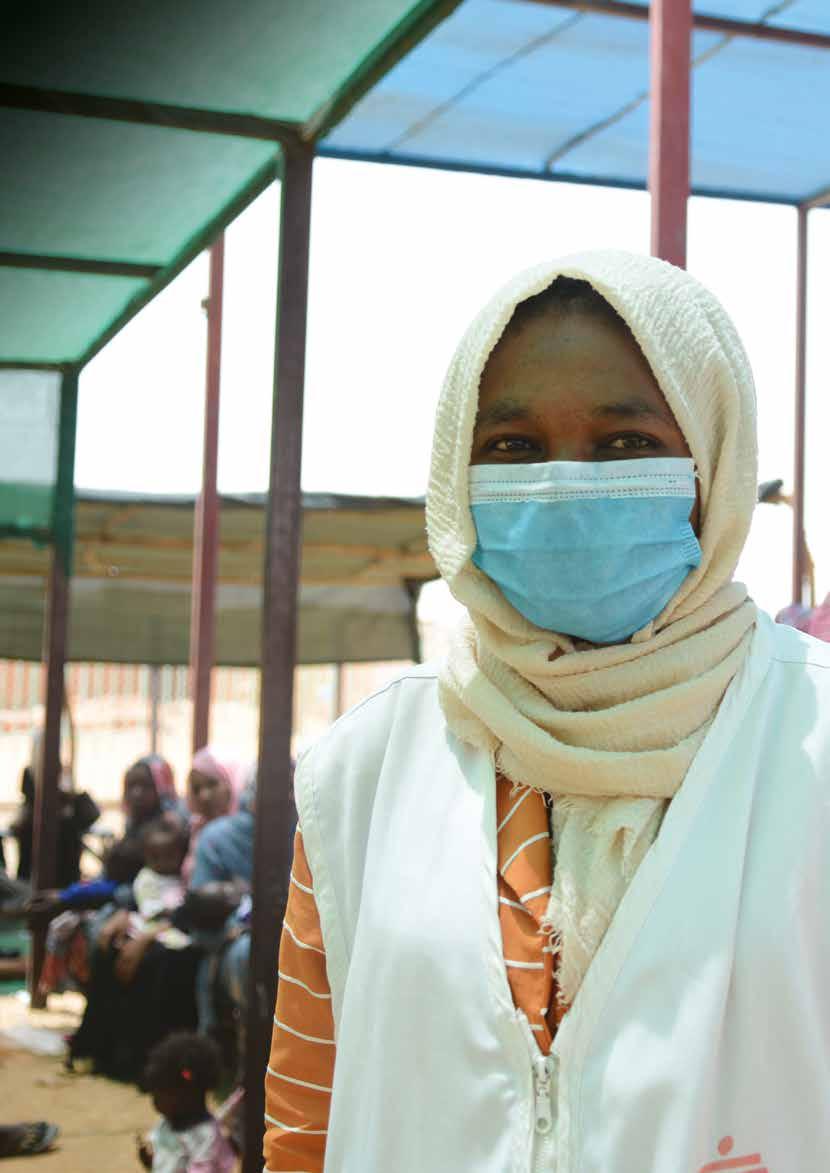
Médecins Sans Frontières Australia Annual Report 2022 – 21
Omdurman project, Sudan. © Majd Aljunaid
YEMEN
In Yemen, MSF worked to address some of the critical needs associated with an unfolding humanitarian crisis.
The start of 2022 saw a dramatic escalation in fighting and airstrikes. Although the conflict reduced in intensity after the United Nations-brokered truce in April, sporadic clashes continued to break out on frontlines, often resulting in casualties among civilians. The deterioration of the economy has had a direct impact on people’s living conditions, health and access to treatment. As food and fuel prices continued to rise in 2022, many families could not afford to eat or travel to health facilities.
The availability of healthcare in the country—in particular, high-quality, affordable basic healthcare at community level—continued to diminish and in some places was non-existent.
Hodeidah governorate
In the port city of Hodeidah, MSF worked in Al-Salakhana hospital until September. We managed the emergency ward, operating theatre and intensive care unit,
conducting a total of 13,219 emergency room consultations and 1,313 surgeries in 2022.
Throughout the year, our teams at the rural hospital of Ad-Dahi, north of Hodeidah, supported inpatient services, including paediatric and neonatal care, and the emergency room. Overall, we conducted 23,168 emergency room consultations and admitted 2,741 children for care.
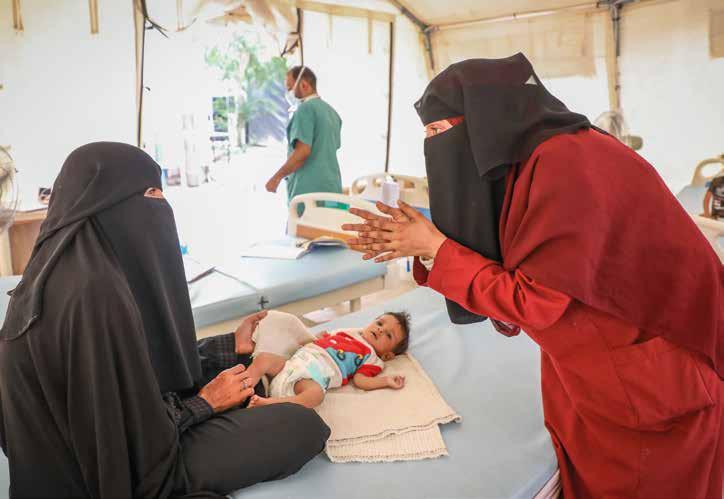
When an outbreak of acute watery diarrhoea was reported in August in AdDahi district, MSF launched an emergency response, supporting the hospital and local healthcare centres with ambulance referrals and surveillance activities.
In both Hodeidah and Ad-Dahi, we recorded slight increases in the numbers of children suffering from severe and moderate acute malnutrition. In response, we scaled up bed capacity in the inpatient therapeutic feeding centre and provided training for
Project locations funded by Australian and New Zealand donors
IMPACT:
47,457 people reached with mental health and health promotion sessions in Ad-Dahi.
PROJECT STAFF: 65
FUNDING: TOTAL AU $23,912,312 $5,061,176 NZ $547,688
KEY ACTIVITIES
Emergency, surgical and intensive care; paediatric and neonatal inpatient care, nutrition.
A community health worker talks with the mother of a patient in Ad-Dahi rural hospital. © MSF/Majd Aljunaid
AMRAN
HODEIDAH
healthcare staff on the management of acute malnutrition.
In Yemen, malnutrition is a persistent risk for children, pregnant women and people who are vulnerable due to other medical conditions. Prior to the escalation of the war in 2014, there were seasonal and annual peaks of malnutrition linked to the lean season between harvests; however, the issue has worsened and become more widespread due to the conflict, which has exacerbated food insecurity for people living in precarious conditions.
Amran governorate
In Khamir, Amran, MSF continued to support Al Salam hospital, which is a Ministry of Health-run hospital where we provide maternal and child healthcare.

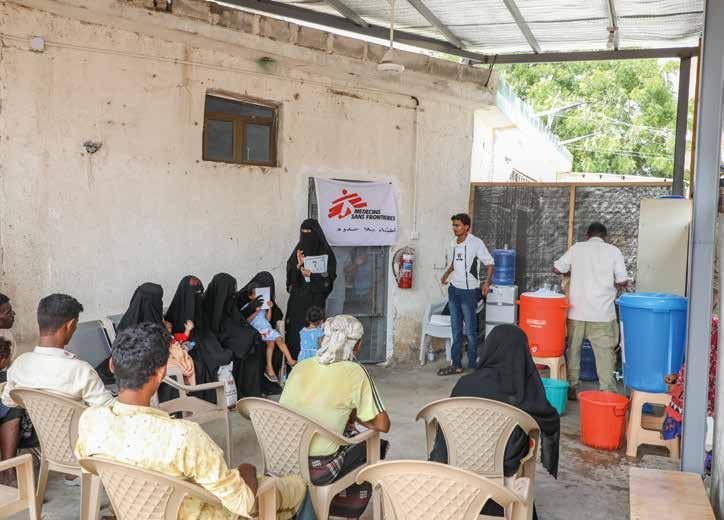
In 2022, our teams at Al Salam hospital noticed an increase in the number of patients requiring treatment for malnutrition. There was also an increase in cases of measles. There has been a resurgence of preventable diseases such as measles, cholera and diphtheria in Yemen due to low vaccination coverage, the collapse of the healthcare system, and
because many people are living in poor conditions in displacement camps, where diseases can easily spread.
We also provided COVID-19 treatment in a semi-permanent structure next to the hospital, which we had set up in 2020, up until May 2022.
An MSF health promoter holds a session with patients and caretakers about acute watery diarrhoea transmission and prevention methods at Ad-Dahi rural hospital. © MSF/Majd Aljunaid
Médecins Sans Frontières Australia Annual Report 2022 – 23
Dhuha Shamsuddin, MSF’s medical activity manager at Ad-Dahi rural hospital. © MSF
AFGHANISTAN
KEY ACTIVITIES
MSF responded to some of the immense health needs caused by decades of conflict and political upheaval. In Herat regional hospital, we supported the paediatric department’s triage, emergency room, intensive care unit, inpatient therapeutic feeding centre and hospitalisation ward. Among the thousands of patients admitted for emergency care, the main reasons for admission were infections of the central nervous system such as meningitis, septic shock, sepsis and pneumonia. In Kahdestan outpatient clinic, Herat province, we delivered basic healthcare for children with moderate acute malnutrition as well as pregnant and lactating women. Our teams also ran emergency responses to COVID-19 and measles outbreaks.
A one-month-old baby in MSF’s inpatient therapeutic feeding centre at Herat regional hospital. © Sandra Calligaro

BANGLADESH
KEY ACTIVITIES
MSF provided basic and specialist healthcare to address some of the immense health needs of Rohingya refugees living in the Cox’s Bazar camps and the needs of the Bangladeshi community, in a 46-bed hospital and two outpatient clinics and via outreach teams. Our care included inpatient treatment of intensive care patients, and of patients with scabies and dengue during outbreaks of those diseases. Our outpatient clinics focused on treatment for chronic diseases, sexual and reproductive healthcare and mental health. We also provided hepatitis C care and developed a national hepatitis C protocol in collaboration with the Ministry of Health, and ran a COVID-19 vaccination campaign. Our teams referred neonatal and maternity patients to other MSF and non-MSF facilities.
Project locations funded by Australian and New Zealand donors
IMPACT:
Admissions to Herat regional hospital’s inpatient therapeutic feeding centre increased by 42 per cent in 2022 compared to 2021, with almost half of patients admitted under six months of age.
PROJECT STAFF:
546
FUNDING:
TOTAL AU $7,848,751 $588,235 NZ $219,067
Project locations funded by Australian and New Zealand donors
IMPACT: MSF worked with 10 traditional birth attendants to help increase engagement with the community on sexual and reproductive healthcare.

PROJECT STAFF:
221
FUNDING:
TOTAL AU $4,096,881 $1,764,706 NZ $273,834
HERAT
Noor Begum is one of the Rohingya volunteer staff supporting MSF’s work on women’s health as a traditional birth attendant in Cox’s Bazar district. © Elizabeth Costa/MSF
COX’S BAZAR DISTRICT
CAMEROON
KEY ACTIVITIES
In Far North region, MSF responded to the increasing health needs by supporting health centres in Mora and Kolofata health districts with basic healthcare, staff training and medical supplies. We also worked with community health volunteers, who have been trained to treat simple cases of common diseases, with the aim to improve access to healthcare at the community level. In Fotokol, we ended our activities after the security situation deteriorated and some of our staff were abducted in January.
CENTRAL AFRICAN REPUBLIC
KEY ACTIVITIES
In 2022, violence continued to affect people’s lives and restrict the delivery of humanitarian aid. Although conflict abated in major towns controlled by government and foreign allied forces in 2022, insecurity remained high in rural areas where armed opposition groups were active. In the capital Bangui, MSF continued to run our surgical trauma facility, known as SICA Hospital. We ran an emergency room and two operating theatres and offered comprehensive treatment, including post-operative care and physiotherapy, for people who had suffered road traffic accidents as well as violenceinflicted injuries.
A patient leaves MSF’s SICA Hospital having completed her inpatient treatment, after being hit by a stray bullet during an attack.

© Adrienne Surprenat/Collectif
Project locations funded by Australian donors
IMPACT: 31,986 consultations carried out by community health volunteers in Mora and Kolofata.

PROJECT STAFF:
180
FUNDING:
TOTAL AU $11,789,185 $2,000,000
Project locations funded by Australian donors
IMPACT: MSF provided much-needed trauma care for people affected by violence.
PROJECT STAFF: 296
FUNDING:
TOTAL AU $6,939,879 $1,764,706
A community health worker consults with a mother and her sick child in Cameroon.
FOTOKOL
© MSF/Nisma Leboul
KOLOFATA FAR NORTH MORA
Médecins Sans Frontières Australia Annual Report 2022 – 25
BANGUI
CHAD
KEY ACTIVITIES
Maternal and child health remained a focus for MSF in Chad in 2022, as the country continued to experience repeated epidemics and nutrition emergencies. In Moīssala, in Mandoul region, our teams continued to work in partnership with the Ministry of Health to improve maternal and paediatric healthcare at Moīssala hospital. Our care included treatment of patients with malaria.
Project locations funded by Australian and New Zealand donors
IMPACT:
MSF teams provided malnutrition treatment in what was for some the driest and shortest rainy season in memory.
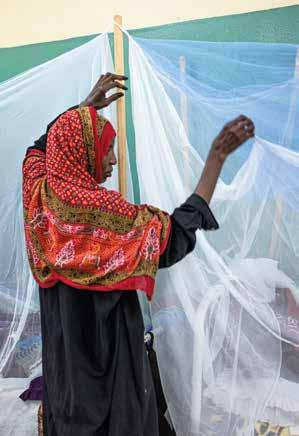
PROJECT STAFF: 96
FUNDING:
TOTAL AU $6,042,745 $300,000 NZ $1,095,337
DEMOCRATIC REPUBLIC OF CONGO
KEY ACTIVITIES
The humanitarian situation deteriorated further last year, mainly due to increased levels of armed violence, in particular the resurgence of the M23 armed group in North Kivu. The escalation in conflict and insecurity forced nearly 600,000 people to flee their homes, in a province where 1.9 million people had already been displaced. MSF maintained activities in Rutshuru territory, where most of the fighting was concentrated, working in the general referral hospital where we supported intensive care, surgery, therapeutic nutrition and sexual violence care. We also supported four health centres in Rutshuru, with a focus on paediatric nutrition.
MSF and Ministry of Health doctors discuss an X-ray of a patient at Rutshuru general referral hospital. © Pablo Garrigos/MSF
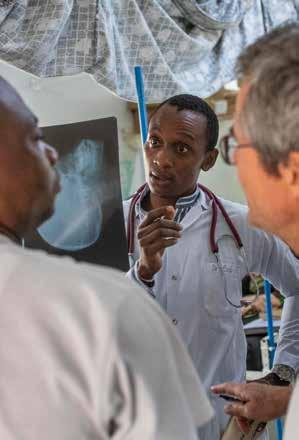
Project locations funded by Australian donors
IMPACT:
12,491 patients admitted for emergency care in Rutshuru.
PROJECT STAFF: 93
FUNDING:
TOTAL AU $6,518,298 $1,764,706
NORTH KIVU
A mother positions a mosquito net, preparing her child’s hospital bed for the night in an MSF hospital. © Fausto Podavini
MOISSALA
HAITI
KEY ACTIVITIES
In 2022, unprecedented levels of gang violence and unrest in Port-auPrince isolated the city for extended periods of time and resulted in escalating numbers of people who were killed or required treatment for trauma injuries. MSF continued to run activities at our trauma hospital in the Tabarre neighbourhood, providing emergency care for people with gunshot and stab wounds, severe burns and injuries related to road accidents. Our services included post-operative physiotherapy, dressings and mental healthcare.
HONDURAS
KEY ACTIVITIES
In collaboration with the Honduran Ministry of Health, MSF provided emergency medical and psychosocial care for victim-survivors of violence, including sexual violence, in San Pedro Sula and Choloma. Our services included family planning, ante- and postnatal consultations and mental health support for marginalised communities in Choloma via mobile clinics. We provided medical and psychological healthcare in San Pedro Sula with a focus on improving access for sex workers and the LGBTQIA+ community, including family planning, cervical cancer screening, pre-exposure prophylaxis for HIV prevention and human papillomavirus vaccinations.
PORT-AU-PRINCE
Project locations funded by Australian donors
IMPACT:
MSF’s Tabarre hospital was the only facility providing specialised care for severe burns in Haiti.
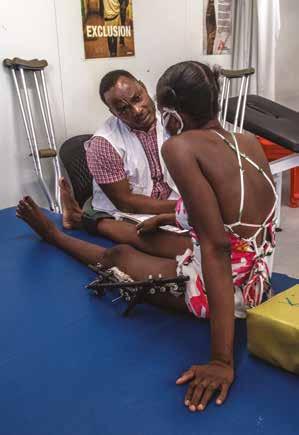
PROJECT STAFF: 244
FUNDING: TOTAL AU $17,396,772 $1,764,706
Project locations funded by Australian donors
IMPACT:
Comprehensive care protocol for victim-survivors of sexual violence approved in Honduras, after 11 years of advocacy by MSF and other organisations.

PROJECT STAFF: 57
FUNDING:
TOTAL AU $2,754,631 $800,000
CHOLOMA
SAN PEDRO SULA
An MSF doctor speaks with a patient during a mobile clinic consultation at a community school in Choloma. © MSF
Médecins Sans Frontières Australia Annual Report 2022 – 27
An 18-year-old patient attends a physiotherapy appointment at MSF’s Tabarre hospital, for follow-up care for a gunshot injury she sustained when a public bus was attacked by armed men. © Johnson Sabin
IRAQ
KEY ACTIVITIES
An MSF team supported Sinuni General Hospital, running a sevenbed unit providing emergency, maternal and neonatal healthcare, and COVID-19 monitoring and stabilisation. Our team also assisted the Iraqi health authorities with the response to COVID-19; supporting with direct intensive care treatment, patient isolation (for mild and moderate cases) and health promotion campaigns to encourage vaccination.
JORDAN
KEY ACTIVITIES
At the MSF hospital in the capital Amman, we continued to provide a comprehensive package of care for war-wounded patients from around the region (primarily Iraq, Syria, Yemen and Palestine), including reconstructive surgery and rehabilitation for people with orthopaedic injuries, burns, gunshot wounds and other conflict-related injuries, as well as physiotherapy and mental health support. We also developed regional networks to ensure continuity of care for patients in their home countries once discharged from the hospital, through follow-up consultations and continued physiotherapy.
Prototypes of hand and arm prostheses made as part of MSF’s 3D-printing program serving patients with amputations in Amman.
 © MSF/SORIYA
© MSF/SORIYA
Project locations funded by Australian donors
IMPACT:
In 2022, we extended access to mental health support in the community by offering services in four healthcare centres in villages around Sinuni town.
PROJECT STAFF: 90
FUNDING:
TOTAL AU $18,755,860 $2,505,000
Project locations funded by Australian donors
IMPACT:
Pre-COVID-19 level of admissions reinstated, following a period in 2021 where part of hospital was transformed into COVID-19 wards to support the Ministry of Health’s response.
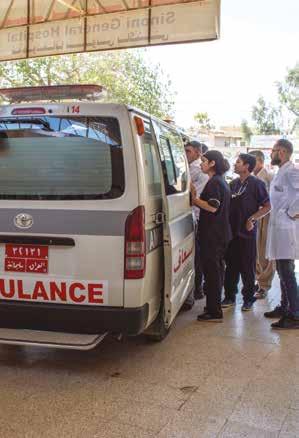
PROJECT STAFF:
205
FUNDING:
TOTAL AU $18,357,654 $2,352,941
AMMAN
MSF medical staff from Sinuni General Hospital prepare a patient for transfer. © MSF
NINEWA SINUNI
KENYA
KEY ACTIVITIES
We provided emergency and sexual and reproductive healthcare at the Lavender House referral centre and training hub in Eastlands, a suburb of Nairobi, and in four sexual violence clinics integrated in public facilities including the Dandora youth-friendly clinic, as well as an emergency call centre and ambulance services. As the longest drought in Kenya in four decades intensified, MSF delivered basic and specialist healthcare and water and sanitation services in and around Dagahaley camp in response to an increased number of Somali refugees arriving to Dadaab.
KIRIBATI
KEY ACTIVITIES
MSF ran activities to improve access to healthcare in a country highly vulnerable to the effects of climate change. We worked to strengthen critical care capacity building, through provision of training to key healthcare workers and of critical care equipment. The project was then refined to focus on maternal and neonatal health, with support for local healthcare staff to improve management of non-communicable diseases such as diabetes during pregnancy, training and clinical support during labour and delivery, and training on neonatal resuscitation and newborn care skills. We also started support to upgrade infrastructure at Tabiteuea North Hospital, using a sustainable approach where possible.
MSF paediatrician Dr Jordan Amor-Robertson (left) leads training in the Helping Babies Breathe program for colleagues in Tarawa. © Manja Leben/MSF
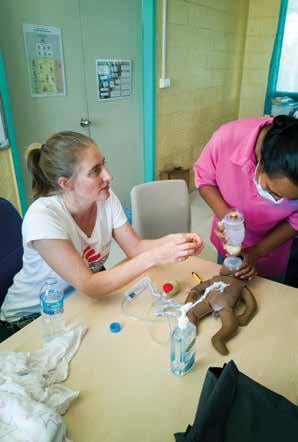
Project locations funded by Australian donors
IMPACT:
Increased consultations in the Lavender House trauma room compared to 2021 (15,956 in 2022) and in the Dandora youth-friendly centre (4,654 in 2022).

PROJECT STAFF: 401
FUNDING: TOTAL AU $16,755,128 $1,676,471
Project locations funded by Australian and New Zealand donors
IMPACT:
Training for midwives, nurses and doctors in the universal Helping Babies Breathe program, to enhance neonatal resuscitation and newborn care skills.
PROJECT STAFF: 6
FUNDING:
TOTAL AU $586,207 $400,000 NZ $186,207
Borow Ali speaks to MSF health promotion supervisor Sheriff Abdi, during an interview inside a shelter in Dadaab. © MSF/Lucy Makori
Médecins Sans Frontières Australia Annual Report 2022 – 29
NAIROBI DADAAB
LEBANON
KEY ACTIVITIES
Since 2019, Lebanon’s multi-layered crisis has pushed more than 80 per cent of its population into poverty. In Bar Elias, Bekaa Valley, where most of the population are refugees, our teams provided hospital care for children living with thalassemia (an inherited blood disorder that affects the production of haemoglobin) as well as community outreach activities in coordination with the Lebanese Red Cross, to encourage blood donations required for thalassemia patients’ regular blood transfusions.
Refugee communities live in informal tented settlements in Bar Elias. ©
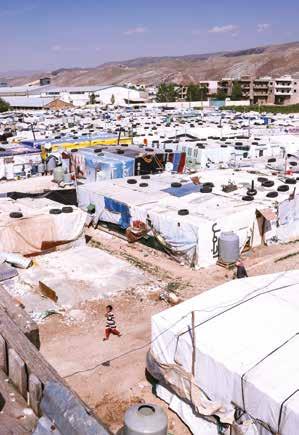 Joffrey Monnier/MSF
Joffrey Monnier/MSF
LIBERIA
KEY ACTIVITIES
MSF provided specialised paediatric care, including surgery and treatment for measles, at our Bardnesville Junction Hospital in Monrovia until closing the hospital in September. We then started support to Bardnesville primary healthcare centre, a public facility, by setting up a semi-permanent structure of 25 beds to provide inpatient paediatric care, as well as staff supervision and training.
A young patient with his mother (in red) and MSF staff who cared for him at Bardnesville Junction Hospital when he was critically ill with cerebral malaria. © Tim Pont/MSF
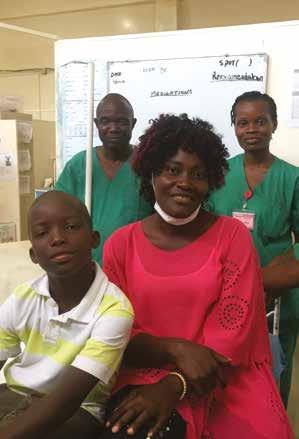
Project locations funded by Australian and New Zealand donors
IMPACT:
Treatment of 89 children living with thalassemia.
PROJECT STAFF: 55
FUNDING:
TOTAL AU $3,335,268 $1,647,059 NZ $219,067
Project locations funded by Australian donors
IMPACT:
Total of 679 children treated for measles at Bardnesville Junction Hospital and eight primary healthcare centres supported with measles kits during the national outbreak from January.
PROJECT STAFF:
174
FUNDING:
TOTAL AU $4,954,290 $1,764,706
MONROVIA
BAR ELIAS
LIBYA
KEY ACTIVITIES
By the end of 2022, there were more than 650,000 migrants in Libya, with many people held in detention centres or in non-official centres scattered across the country. MSF continued to hear accounts from migrants who were subjected to multiple forms of ill treatment, such as physical abuse and sexual violence, as well as arbitrary arrests and detention in inhumane conditions, kidnapping, forced labour and other forms of exploitation. Our teams supported care for migrants as well as local people via support for a hospital in Misrata.

MADAGASCAR
KEY ACTIVITIES
In Ambovombe district, Androy region, MSF responded to the nutrition emergency, providing care at an inpatient therapeutic feeding centre and at mobile nutrition clinics, as well as carrying out food distributions. We ended these activities in June after observing improvements in the nutrition situation linked with increased assistance from other non-governmental organisations, and better rainfalls and harvests. We then shifted to focus on improving people’s access to clean water, by drilling boreholes and supporting the community’s capacity to maintain water systems.
Three women return to their village after collecting water from a distribution organised by MSF in the village of Fenoiva. © Lucille
 Guenier/MSF
Guenier/MSF
Project locations funded by Australian donors
IMPACT:
As one of the few international non-governmental organisations working in Libya, our teams provided general healthcare and psychosocial support to migrants held in detention centres and living in makeshift housing in the northwest of the country.
PROJECT STAFF: 52
FUNDING:
TOTAL AU $3,386,373 $588, 235
ANDROY
Project locations funded by Australian donors
IMPACT:
Work with locals to rehabilitate existing water pumps with locally sourced spare parts and training of technicians to repair pumps.
PROJECT STAFF:
84
FUNDING:
TOTAL AU $2,961,984 $1,176,471
Migrants living in a squat in Misrata. © MSF
Médecins Sans Frontières Australia Annual Report 2022 – 31
MISRATA
MALAWI
KEY ACTIVITIES
The mortality rates for cervical cancer in Malawi are among the highest in the world. In Blantyre, in collaboration with Malawian health authorities, an MSF project offered comprehensive care for women with cervical cancer with the aim to improve access to prevention, screening, diagnosis and treatment. We provided treatment for patients at Queen Elizabeth Central Hospital in Blantyre, and operated screening units integrated in health centres in several districts of the Southern Region. As radiotherapy is not available in Malawi, MSF also referred some patients to Nairobi, Kenya, for treatment.
Women receiving treatment for cervical cancer at Queen Elizabeth Central Hospital learn about nutrition. © Diego Menjibar
MALI
KEY ACTIVITIES
The humanitarian situation deteriorated in Mali in 2022, as clashes between armed groups and military forces intensified, causing the displacement of communities. In Koutiala district, MSF continued to run a large paediatric and nutrition program focusing on children under five years of age. We provided preventive and curative care at hospital level as well as via support for community health facilities and ‘malaria agents’ who diagnose and treat malaria at the community level during peak malaria periods.
A lab technician observes bacteria under a microscope during the clinical evaluation phase of Antibiogo in the laboratory of the Koutiala project. © Ismael Diallo

Project locations funded by Australian and New Zealand donors
IMPACT:
Social support provided to patients including transport vouchers, psychosocial support and therapeutic education.

PROJECT STAFF: 218
FUNDING:
TOTAL AU $6,899,896 $2,000,000 NZ $547,688
KOUTIALA
Project locations funded by Australian donors
IMPACT:
Implementation of new mobile application Antibiogo, to help identify antibiotic resistance and enable doctors to prescribe the most adequate antibiotics accordingly in Koutiala.
PROJECT STAFF:
307
FUNDING:
TOTAL AU $7,394,133 $1,764,706
BLANTYRE
MOZAMBIQUE
KEY ACTIVITIES
In Nampula province, in collaboration with the Ministry of Health, MSF provided preventive and curative care to address vector-borne and neglected tropical diseases which are climate sensitive, such as schistosomiasis (bilharzia, carried by parasitic worms), filariasis (carried by mosquitoes) and scabies. We supported more than a dozen healthcare centres and trained healthcare staff to detect and treat diseases.
NIGERIA
KEY ACTIVITIES
At Jahun general hospital, Jigawa state, MSF ran the maternity and neonatal departments and a clinic dedicated to treating women affected by obstetric fistula, a condition caused by damage to the birth canal during prolonged or obstructed labour. We also supported basic obstetrics in four health centres in the state to reduce complications during pregnancy.
In Bauchi state, we launched an emergency response to malnutrition, supporting outpatient therapeutic feeding centres in Ganjuwa and Toro, and supported the Ministry of Health with responses to outbreaks of measles, cholera and Lassa fever.
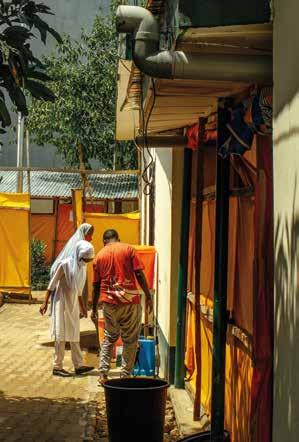
Project locations funded by Australian donors
IMPACT:
Objective to strengthen surveillance and preparedness for emergencies such as cholera outbreaks and disasters including droughts, floods and cyclones.
PROJECT STAFF:
49
FUNDING:
TOTAL AU $5,725,443 $1,500,000
donors
IMPACT: 2,000 children provided with nutritional support in Ganjuwa.
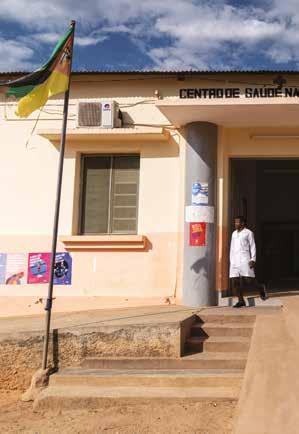
PROJECT STAFF:
393
FUNDING:
TOTAL AU $16,126,637 $2,352,941 NZ $684,662
Nurse Jackson Pedro Muchama at the Nametil clinic in Nampula province.
© Tadeu Andre/MSF
NAMPULA
A staff member sprays medical staff’s feet in an MSF-supported hospital in northern Nigeria, during a cholera outbreak. © MSF/Hussein Amri
Project locations funded by Australian and New Zealand
Médecins Sans Frontières Australia Annual Report 2022 – 33
JIGAWA BAUCHI
PAKISTAN
KEY ACTIVITIES
In Peshawar, we provided comprehensive emergency obstetric and neonatal care to address the needs of neglected communities such as Afghan refugees and internally displaced people at MSF’s women’s hospital to its closure in September in response to an evolving health context in the province, including 24/7 emergency care for women suffering from complicated pregnancies and difficult deliveries. Our outreach teams also provided health education on mother and child health and the prevention of various diseases to rural communities in the surroundings of Peshawar district.
A patient recovers with her baby in the inpatient department of MSF’s Peshawar women’s hospital, after a caesarean section because of a breech delivery. ©
PALESTINE
KEY ACTIVITIES
In 2022, MSF continued to provide specialised medical services in the Gaza Strip, where the overstretched healthcare system has been severely affected by the 15-year Israeli blockade. We offered comprehensive care in hospitals and outpatient clinics for people with trauma injuries and burns, including surgery, physiotherapy, psychological support, occupational therapy and health education, as well as reconstructive surgery in northern Gaza, and support for laboratories to identify and treat antibiotic-resistant infections.
Amro Ayman Alhadad accessed support with MSF as part of his recovery after being shot in 2018 and having his leg amputated.
 © Giles Duley
© Giles Duley
Project locations funded by Australian and New Zealand donors
IMPACT:
More than 54,400 births assisted at Peshawar women’s hospital during the 11-year life of the project.
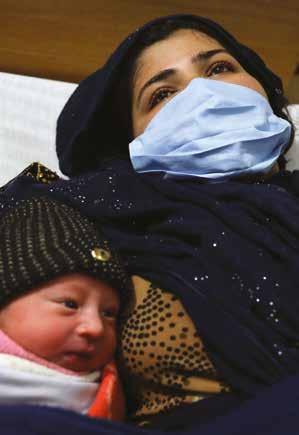
PROJECT STAFF: 278
FUNDING: TOTAL AU $4,682,448 $1,408,028 NZ $372,989
Project locations funded by Australian donors
IMPACT: Expansion of activities to provide burns care, with support launched for two hospital burns units.
PROJECT STAFF: 202
FUNDING:
TOTAL AU $12,092,297 $2,352,941
GAZA STRIP
WEST BANK
Zahra Shoukat
KHYBER PAKHTUNKHWA
KEY ACTIVITIES
In Port Moresby, in collaboration with the national tuberculosis program, MSF provided care for patients with tuberculosis including harder to cure drug-resistant forms of the disease at Gerehu hospital, and via home visits for patients who could not access clinics or who required support to adhere to treatment. We offered preventive tuberculosis treatment for close contacts of patients with tuberculosis. We ran community-based casefinding activities to improve early detection and health promotion to provide knowledge about the disease and its treatment, in areas of Port Moresby at higher risk of the disease, such as low-income and densely populated neighbourhoods with inadequate sanitation, and constructed a new clinic for drugresistant tuberculosis care in Six Mile, in the city’s northeast.
PAPUA NEW GUINEA PHILIPPINES
KEY ACTIVITIES
In coordination with the Manila Health Department, MSF ran activities to improve early diagnosis and treatment of tuberculosis. We provided tuberculosis screening in Tondo (a densely populated and impoverished area of Manila) with a new mobile X-ray truck, as well as health promotion and referral of patients identified to have tuberculosis to local health centres for treatment. We visited homes to screen patients’ household close contacts, administer tuberculosis skin tests and offer preventative tuberculosis treatment for children.
Project locations funded by Australian donors
IMPACT:
All-oral medication regimens for patients with multidrug-resistant tuberculosis, which lead to overall better treatment adherence due to fewer side effects and removing the need for painful injections.
PROJECT STAFF: 78
FUNDING: TOTAL AU $3,256,972 $1,764,706
Project locations funded by Australian donors
IMPACT:
Total of 3,282 people, and 1,238 of their household contacts, screened for tuberculosis via active case finding activities.

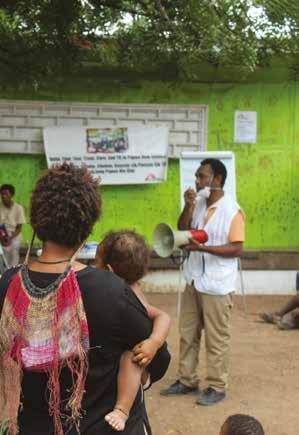
PROJECT STAFF: 25
FUNDING:
TOTAL AU $1,189,389 $941,176
PORT MORESBY
MANILA
An MSF outreach team discusses tuberculosis symptoms and prevention measures with a community in Port Moresby. © Leanne Jorari/MSF
– 35
A woman speaks to an MSF staff member, having come for tuberculosis screening with her grandsons at the MSF mobile X-ray truck in Tondo. © Ezra Acayan Médecins Sans Frontières
Australia Annual Report 2022
SYRIA
KEY ACTIVITIES
At the end of 2022, there were around 4.4 million people residing in northwest Syria, of whom roughly 2.8 million were internally displaced. Their already precarious living conditions continued to deteriorate due to the conflict and a worsening economic situation, and needs for humanitarian aid remained high with aid to the area having decreased. In Idlib governorate, MSF continued to run a specialised burns facility in Atmeh—the only one in the area. We also supported primary healthcare centres and ran mobile clinics to provide care, including sexual and reproductive healthcare, mental health support and prevention activities during the cholera outbreak.
A man living in a camp in Idlib governorate, having fled his hometown in 2016 due to heavy
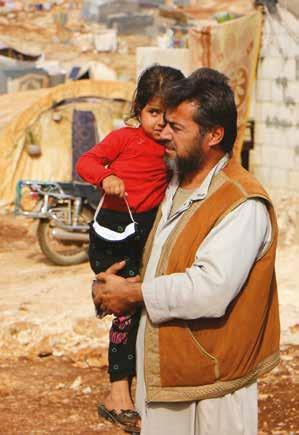
UGANDA
KEY ACTIVITIES
In 2022, MSF collaborated with the regional hospital and Arua city municipality to improve COVID-19 case management (triage, homebased care and hospital care) and set-up preventive care measures in Arua. We provided sexual and reproductive healthcare and mental health support for the mainly South Sudanese refugees living in Omugo and Imvepi camps. We continued to improve quality of care in all activities in the Arua project in preparation for the handover of our HIV and tuberculosis program to the Ministry of Health in 2023.
Project locations funded by Australian donors
IMPACT:
Distribution of hygiene kits and water purification tablets to 8,158 displaced families to help prevent spread of cholera.
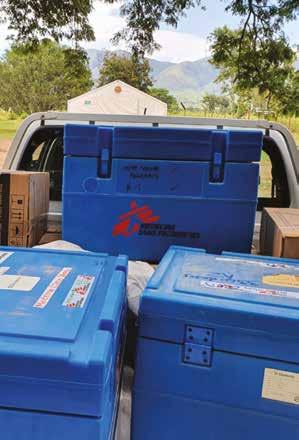
PROJECT STAFF: 409
FUNDING:
TOTAL AU $4,740,667 $1,764,706
Project locations funded by Australian donors
IMPACT:
An increased number of mental health and sexual violence patients accessed healthcare in the refugee settlements of Omugo and Imvepi.
PROJECT STAFF:
112
FUNDING:
TOTAL AU $2,658,698 $1,764,706
MSF teams delivering COVID-19 vaccines in Kasese district. © Théo Wanteu/MSF
ARUA
IDLIB
shelling. © Abdul Majeed Al Qareh/MSF
KEY ACTIVITIES
Full-scale war erupted in Ukraine in February 2022, after eight years of conflict in the east of the country. In 2022, thousands of civilians were killed or injured, and homes, key infrastructure and public services were destroyed or disrupted. MSF provided medical and mental healthcare for people sheltering in the underground stations of Kharkiv; and ran mobile clinics in areas of southern Ukraine to provide support in areas retaken by the Ukrainian forces. In coordination with the Ukrainian Interior Ministry and the Ministry of Health in Kyiv and Vinnytsia, we offered specialised physiotherapy, as well as psychological and psychiatric treatment, in two hospitals.
CLIMATE SMART
KEY ACTIVITIES
In 2022, MSF Australia actively supported the Climate Smart project, which aims to scale climate solutions across the MSF movement. Aligned with our commitment to reduce carbon emissions by 50 per cent by 2030, Climate Smart plays an important role in convening stakeholders, monitoring our progress, and assisting MSF Institutional Members in developing environmental roadmaps that align with our decarbonisation targets. Through workshops, webinars, and the development of specialised tools and expertise in areas such as energy, supply chain, and fleet management, Climate Smart is a significant initiative driving impactful change and accountability within our organisation so we can credibly reach our carbon target. ©
MSF
Project locations funded by Australian and New Zealand donors
IMPACT:
Support for networks of local volunteers in southern Ukraine to re-establish access to basic healthcare.
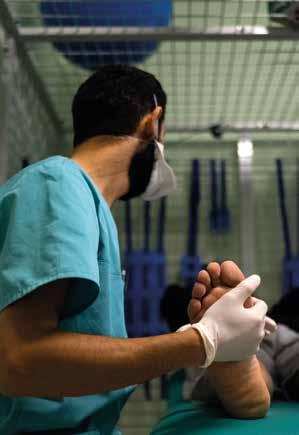
PROJECT STAFF: 26
FUNDING: TOTAL AU $5,506,719 $1,083,512 NZ $494,330
AU $734,142

UKRAINE
An MSF physiotherapist during a therapeutic session with a patient following leg surgery, Kyiv. © Hussein Amri/MSF
KHARKIV
Médecins Sans Frontières Australia Annual Report 2022 – 37
KHERSON VINNY TSIA KYIV
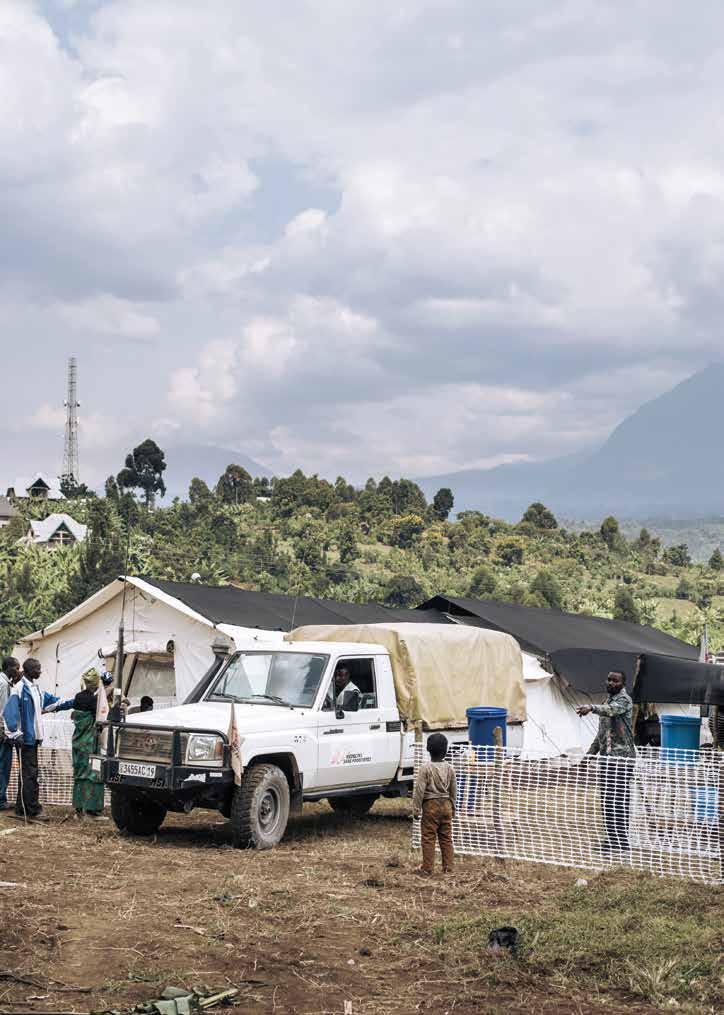 Children stand in front of the entrance to an MSF mobile clinic in North Kivu province, eastern Democratic Republic of Congo. MSF set up the clinic near where almost 15,000 conflictdisplaced people arrived In July 2022. The front line was just a few miles from the village. © Alexis Huguet
Children stand in front of the entrance to an MSF mobile clinic in North Kivu province, eastern Democratic Republic of Congo. MSF set up the clinic near where almost 15,000 conflictdisplaced people arrived In July 2022. The front line was just a few miles from the village. © Alexis Huguet
MÉDECINS SANS FRONTIÈRES AUSTRALIA LIMITED
ABN 74 068 758 654 CONSOLIDATED FINANCIAL REPORT FOR THE FINANCIAL YEAR ENDED
31 DECEMBER 2022
CONSOLIDATED FINANCIAL REPORT FOR THE FINANCIAL YEAR ENDED 31 DECEMBER 2022 MÉDECINS SANS FRONTIÈRES AUSTRALIA LIMITED Contents Page Directors' Report 3 Auditor's Independence Declaration 11 Auditor's Report 12 Director's Declaration 15 Consolidated Statement of Comprehensive Income 16 Consolidated Statement of Financial Position 17 Consolidated Statement of Changes in Equity 19 Consolidated Statement of Cash Flows 20 Notes to the Consolidated Financial Statements 21 2
MÉDECINS SANS FRONTIÈRES AUSTRALIA LIMITED DIRECTORS' REPORT
The directors of Médecins Sans Frontières Australia submit herewith the annual Financial Report of the company for the financial year ended 31 December 2022. The names and particulars of the directors during or since the end of the financial year are:
Katrina Penney President from 29 May 2021. Elected to Board 29 May 2021. Previously member of the Board 2013-2019. Trustee, MSF New Zealand Charitable Trust. Registered Nurse and Midwife. Board member, Alzheimer’s Northland Society. Educator for eCALD – cultural and linguistic diversity (CALD). Resident of New Zealand. Owner/operator L&P Avo. Attended ten out of ten directors’ meetings.
Dwin Tucker
Vice-President from 29 May 2021. President from 23 May 2020 to 29 May 2021. Treasurer from 29 April 2016 to 23 May 2020. Elected to the Board 16 May 2015. Re-elected 25 May 2018. Appointed to the Board 1995-1997. Director, Deafness Forum, Clearasound and TurnkeyIO. Fellow of the Australian Institute of Company Directors. Resident of Australia. Attended ten out of ten directors’ meetings.
Beth Hilton Thorp Treasurer from 23 May 2020 until 28 May 2022. Elected 18 May 2013, re-elected 29 April 2016, re-elected 12 May 2019. Lawyer and consultant. Resident of Australia. Attended three out of three directors’ meetings.
Kerry Atkins
Treasurer from 28 May 2022. Elected to the Board 12 May 2019. Reelected to the Board 28 May 2022. CPA qualified, Graduate of the Humanitarian Leadership Program at Deakin University. Director of Finance and Operations, and Company Director, The Nature Conservancy Limited. Resident of Australia. Attended nine out of ten directors’ meetings.
Emma Campbell
Elected to the Board 28 May 2022. Former CEO of ACT Council of Social Services and former CEO of Federation of Ethnic Communities’ Councils of Australia. PhD Australian National University from College of Asia and the Pacific. Resident of Australia. Attended six out of six directors’ meetings.
Elected to the Board 29 May 2021. Registered nurse and midwife. Retired. Resident of Australia. Attended nine out of ten directors’ meetings.
Appointed to the Board 21 September 2022. Vice-President of MSF France. Independent consultant in the development and humanitarian sector. Resident of France. Attended three out of four directors’ meetings.
Elected to the Board 22 May 2020. Registered nurse. Principal Policy Officer, Preparedness, State Preparedness & Response Branch, NSW Ministry of Health. Resident of Australia. Attended nine out of ten directors’ meetings.
3
Maria Cartwright
Ghassan Abou Chaar
Bethany Lansom
MÉDECINS SANS FRONTIÈRES AUSTRALIA LIMITED DIRECTORS' REPORT
Elected to the Board 28 May 2022. Medical Doctor (Anesthetist). Resident of New Zealand. Attended six out of six directors’ meetings.
Appointed to the Board 15 December 2021. Elected to the Board 28 May 2022. Medical doctor (Orthopaedic surgeon). Rural health care and outreach for Indigenous communities in remote regions of WA. Resident of Australia. Attended nine out of ten directors’ meetings.
Appointed to the Board on 6 March 2017. Completed term as Director 28 May 2022. Medical doctor and President, Médecins Sans Frontières France. Resident of France. Attended three out of three directors’ meetings.
Appointed to the Board 16 October 2020. Elected to the Board 29 May 2021. Infectious Diseases Physician in Launceston General Hospital and Honorary senior clinical lecturer at the University of Tasmania. Resident of Australia. Attended nine out of ten directors’ meetings.
4
Dr Thomas Schaefer
Dr Meguerditch Terzian
Dr Mohammad-Ali Trad
Dr Sivapalan Namasivayam
MÉDECINS
SANS FRONTIÈRES AUSTRALIA LIMITED DIRECTORS' REPORT (continued)
COMPANY SECRETARY (JOINT)
Ms Jennifer Tierney, Executive Director of Médecins Sans Frontières Australia Limited.
Ms Emma Sullivan Smith, Association Coordinator of Médecins Sans Frontières Australia Limited.
SHORT-AND LONG-TERM OBJECTIVES AND STRATEGY
The Group’s short-and long-term objectives are to: Continue to deliver our core medical humanitarian work:
Attracting and developing high-quality project staff and efficiently matching them to the needs of the organisation internationally;
Raising funds to build sustainable financial health of the organisation so that we can deliver care to patients;
Speaking out and advocating for and with our patients, bearing witness to their needs and inspiring support in our social mission;
Providing medical expertise in women’s health, paediatric and neonatal health and sexual violence care, and providing direct support to our medical humanitarian projects.
Putting patients first: championing patient-centred care in all the projects in which we work, focusing our communications around a patient-centred narrative, and supporting regional partnerships which are patient-centred, environmentally responsible, locally relevant and more efficient.
Engaging our communities: shifting our communications approach to improve our engagement with our audiences, continuing to provide excellent donor care and employing new technologies and ways of working to ensure our organisation is prepared for the future.
Valuing our people: offering an inclusive workplace environment and culture and developing our culture so that we work with greater agility and responsiveness to the needs of our patients.
The Group’s strategy for achieving these objectives: Transform our working practice to respond flexibly and effectively to our patients’ needs. Our approach is focused around three themes: 5
PRINCIPAL ACTIVITIES
MÉDECINS SANS FRONTIÈRES AUSTRALIA LIMITED DIRECTORS' REPORT (continued)
The principal activities of the Group during the financial year to 31 December 2022 have been:
Fundraising from the Australian and New Zealand general public in order to finance the medical humanitarian operations of Médecins Sans Frontières.
Liaison with institutions and individuals in Australia and internationally, with a view to obtaining funding or other operational support for medical humanitarian projects, and for coordination with other organisations involved in overseas humanitarian relief.
Provision of medical expertise in women’s health, paediatric and neonatal health and sexual violence care through direct visits to Médecins Sans Frontières medical humanitarian projects overseas, technical support and oversight, preparation of medical staff, medical training, medico-operational research, medical communications and medical policy development.
Operational participation in medical humanitarian projects, through financing operations; assignment of project staff; participation as faculty in various Australian and international training courses for project staff; and evaluation visits to the projects.
Engaging with communities in the form of dissemination of public information on humanitarian and development issues; provision of materials and spokespeople to journalists in the print and electronic media; publication of newsletters; participation in seminars; and guest lectureships at secondary schools and universities.
PERFORMANCE MEASURES
The Group measures performance through the establishment and monitoring of benchmarks including:
100 per cent compliance with all regulatory requirements;
Risks are identified, monitored and mitigation strategies put in place;
Fundraising meets the needs of the organistion to fund operations;
Proportion of financial resource spend across social mission and administrative costs within an appropriate range;
Australian and New Zealand recruitment and placement executed to meet resource needs identified within the MSF organisation;
Patient-centred operational impact for Sydney Medical Unit expertise in women's paediatric and neonatal health and sexual violence care continues; and
Growth in engagement - communications, awareness raising, and advocacy to inspire support for our patients' needs.
6
The performance against these key performance indicators is as follows:
Revenue in 2022 decreased by 4.6 per cent compared to prior year.
Financial resources allocated 72.4 per cent social mission costs to 27.6 per cent fundraising and administration cost in 2022.
Total 33 new recruits and 130 field placements made during 2022 in accordance with identified needs.
In 2022, 64 projects in 50 countries received technical oversight, field support and training in women's health, child health and sexual violence care.
REVIEW OF OPERATIONS
The net operating deficit for the financial year to 31 December 2022 was $4,792,563 (2021: operating surplus of $8,936,480). Deficits can result from timing differences across years between inflow of fundraising funds and an outflow of funds to operational centres.
CHANGES IN STATE OF AFFAIRS
During the financial year, there was no other significant change in the state of affairs of the Group, other than that referred to in the financial statements or notes thereto.
Médecins Sans Frontières Australia Limited continued the strategy of face-to-face fundraising whereby the organisation contracts a third party to approach members of the public, in public places, to recruit new project partners. The financial impact continues to be that a cost is created at the outset that is more than made up over subsequent years of income. Médecins Sans Frontières Australia Limited continues to diversify its sources of funding and to increase regular project partner donations.
Médecins Sans Frontières Australia Limited continues to pay field staff directly from Australia when they go to the field. Project staff are seconded to and managed by the operational centres running each project. The financial impact of this is not significant as the salary cost incurred by Médecins Sans Frontières Australia Limited is recharged to the relevant operational centres.
In total, during 2022, Médecins Sans Frontières Australia Limited committed $47,267,385 (2021: $45,606,303) of funds Operational Centre Paris, and $20,011,182 (2021: $19,545,558) to Operational Centre Geneva. Additionally, Médecins Sans Frontières Australia Limited committed $734,142 to Climate SMART (2021: $364,346).
In selecting the projects which Médecins Sans Frontières Australia Limited supports through its grant payments to Operational Centre Paris and Operational Centre Geneva, the Department of Foreign Affairs and Trade's List of developing countries' is consulted to ensure compliance requirements are fulfilled.
7
MÉDECINS SANS FRONTIÈRES AUSTRALIA LIMITED DIRECTORS' REPORT (continued)
DONATIONS IN KIND
Over the course of the year the Group has received donations in kind from a number of sources. These donations may be physical assets for use in the Group, items to be sent to the projects or services provided to Médecins Sans Frontières at reduced rates.
The value of donations in kind received during the year to 31 December 2022 is $647,893 (2021: $575,332). This amount has been brought to account in the financial statements.
VOLUNTARY ASSISTANCE AND PROJECT STAFF
In addition to donations in kind, the Group recruits a number of project staff for Médecins Sans Frontières operational centres. There are six Médecins Sans Frontières operational centres and they are located in Belgium, France, Holland, Switzerland, Spain and West and Central Africa. The Group estimates that the total salaries forgone by project staff working within their professional capacity in Australia for the year ended 31 December 2022 to be approximately $1,734,264 (2021: $1,752,805).
The Group estimates that the total salaries forgone by project staff working within their professional capacity in Australia who undertook assignments of less than three months to be approximately $292,233 (2021: $345,005).
Médecins Sans Frontières Australia Limited also has a number of volunteers who freely give their time in the Australia office to assist in office-based activities. The estimated value of this is approximately $42,389 (2021: $56,756).
The Board of Directors (except for the President of the Board, who receives a partial salary) and Association also freely give their time to Médecins Sans Frontières Australia Limited. The estimated value of the time provided by the Board of Directors is approximately $501,750 (2021: $424,640).
This time donated by office volunteers, and salaries which would have been paid to the project staff, are not brought to account in the financial statements since they cannot be reliably measured (estimates above are based on high level analysis only).
MONEY SPENT
The social mission of Médecins Sans Frontières Australia Limited is to provide assistance to people in distress, to victims of natural or man-made disasters and victims of armed conflict and to increase awareness of the plight of these people. The international Médecins Sans Frontières organisation as a whole, targets a social mission ratio whereby around 80% of expenditure is directly devoted to this social mission. In 2022 Médecins Sans Frontières Australia Limited spent $81,901,421 on the social mission representing 72.4% of total expenditure (2021: $78,170,856). A number of factors impact the ratio and will continue to be ongoing factors:
Maintaining sufficient levels of cash reserves in subsequent years to preserve the safety of operational funding.
Responding to the operational needs of the operational centres. Administrative and Fundraising requirements.
(continued) 8
MÉDECINS SANS FRONTIÈRES AUSTRALIA LIMITED DIRECTORS' REPORT
SUBSEQUENT EVENTS
MÉDECINS
SANS FRONTIÈRES AUSTRALIA LIMITED DIRECTORS' REPORT (continued)
There has not been any matter or circumstance that has arisen since the end of the financial year that has significantly affected, or may significantly affect, the operations of the Group, the results of those operations, or the state of affairs of the Group in future financial years.
FUTURE DEVELOPMENTS
It is likely that in future financial years, the Group will continue to provide operational, financial, and human resource support to the project operations of Médecins Sans Frontières financed substantially by income from private fundraising. Where possible, subject to the availability of resources, the company intends to increase its level of support for the project operations of Médecins Sans Frontières.
DIVIDENDS
Under the terms of the Group’s constitution, the Group is not authorised to pay dividends.
INDEMNIFICATION OF OFFICERS
During the financial year, the Group paid a premium in respect of a contract insuring the directors and officers of the company (as listed on page 3 of the Financial Report) against a liability incurred as such a director to the extent permitted by the Australian Charities and Not-for-profits Commission Act 2012. The contract of insurance prohibits disclosure of the nature of the liability and the amount of the premium.
The Company has not otherwise, during or since the financial year, except to the extent permitted by law, indemnified or agreed to indemnify an officer of the company or of any related body corporate against a liability incurred as an officer.
INDEMNIFICATION OF AUDITORS
To the extent permitted by law, the Group has agreed to indemnify its auditors, Crowe Audit Australia, as part of the terms of its audit engagement agreement against claims by third parties arising from the audit (for an unspecified amount). No payment has been made to indemnify Crowe Audit Australia during or since the financial year.
REMUNERATION OF DIRECTORS AND SENIOR MANAGEMENT
Information about the remuneration of directors and senior management is set out in Note 5 of the financial report on pages 32 to 33. 9
INDEPENDENCE DECLARATION
A copy of the Auditor’s Independence Declaration that has been provided in accordance with subdivision 60-C section 60-40 of Australian Charities and Not-for-profits Commission Act 2012 is set out on page 11.
Signed in accordance with a resolution of the directors.


On behalf of the directors
Katrina Penney Director
Sydney, 24 April 2023
Kerry Atkins Director
Sydney, 24 April 2023
10
MÉDECINS SANS FRONTIÈRES AUSTRALIA LIMITED
Crowe Audit Australia
ABN 13 969 921 386
Level 24, 1 O’Connell Street
Sydney NSW 2000
Main +61 (02) 9262 2155
Fax +61 (02) 9262 2190 www.crowe.com.au
24 April 2023
The Board of Directors
Médecins Sans Frontières Australia Limited
4/1-9 Glebe Point Road
Glebe NSW 2037
Dear Directors
Médecins Sans Frontières Australia Limited
In accordance with the requirements of section 60-40 of the Australian Charities and Not-for-profits Commission Act 2012, I am pleased to provide the following declaration of independence to the Directors of Médecins Sans Frontières Australia Limited.
As lead audit partner for the audit of the financial report of Médecins Sans Frontières Australia Limited for the financial year ended 31 December 2022, I declare that to the best of my knowledge and belief, that there have been no contraventions of:
(i) the auditor independence requirements of the Australian Charities and Not-for-profits Commission Act 2012 in relation to the audit; and

(ii) any applicable code of professional conduct in relation to the audit.
Yours sincerely,
Crowe Audit Australia
 Alison Swansborough Associate Partner
Alison Swansborough Associate Partner
Liability limited by a scheme approved under Professional Standards Legislation.

The title ‘Partner’ conveys that the person is a senior member within their respective division, and is among the group of persons who hold an equity interest (shareholder) in its parent entity, Findex Group Limited. The only professional service offering which is conducted by a partnership is external audit, conducted via the Crowe Australasia external audit division and Unison SMSF Audit. All other professional se rvices offered by Findex Group Limited are conducted by a privately owned organisation and/or its subsidiaries.
Findex (Aust) Pty Ltd, trading as Crowe Australasia is a member of Crowe Global, a Swiss verein. Each member firm of Crowe Global is a separate and independent legal entity. Findex (Aust) Pty Ltd and its affiliates are not responsible or liable for any acts or omissions of Crowe Global or any other member of Crowe Global. Crowe Global does not render any professional services and does not have an ownership or partnership interest in Findex (Aust) Pty Ltd. Services are provided by Crowe Sydney, an affiliate of Findex (Aust) Pty Ltd. Li ability limited by a scheme approved under Professional Standards Legislation.
© 2023 Findex (Aust) Pty Ltd 11
Crowe Audit Australia
ABN 13 969 921 386
Level 24, 1 O’Connell Street
Sydney NSW 2000
Main +61 (02) 9262 2155
Fax +61 (02) 9262 2190
www.crowe.com.au

Independent Auditor’s Report to the Members of Médecins Sans Frontières Australia Limited
Report on the Audit of the Financial Report Opinion
We have audited the financial report of Médecins Sans Frontières Australia (the Company) and its subsidiaries (the Group), which comprises the consolidated statement of financial position as at 31 December 2022, the consolidated statement of comprehensive income, the consolidated statement of changes in equity and the consolidated statement of cash flow for the year then ended, and notes to the financial statements, including a summary of significant accounting policies, and the directors’ declaration.
In our opinion, the accompanying financial report of the Group has been prepared:
1. in accordance with Division 60 of the Australian Charities and Not-for-profits Commission Act 2012 (the ACNC Act), including:
(a) giving a true and fair view of the Group’s financial position as at 31 December 2022 and of its financial performance for the year then ended; and
(b) complying with Australian Accounting Standards – Simplified Disclosures and Division 60 of the Australian Charities and Not-for-profits Commission Regulation 2022; and
2. in all material respects, in accordance with the requirements of the Charitable Fundraising Act
NSW 1991 and the Charitable Fundraising Regulation 2015, and the requirements of the WA Charitable Collections Act (1946) and the WA Charitable Collections Regulations (1947)
Basis for Opinion
We conducted our audit in accordance with Australian Auditing Standards. Our responsibilities under those standards are further described in the Auditor’s Responsibilities for the Audit of the Financial Report section of our report. We are independent of the Group in accordance with the ethical requirements of the Accounting Professional & Ethical Standards Board’s APES 110 Code of Ethics for Professional Accountants (including Independence Standards) (the Code) that are relevant to our audit of the financial report in Australia. We have also fulfilled our other ethical responsibilities in accordance with the Code.
We believe that the audit evidence we have obtained is sufficie nt and appropriate to provide a basis for our opinion.
Liability limited by a scheme approved under Professional Standards Legislation.
The title ‘Partner’ conveys that the person is a senior member within their respective division, and is among the group of persons who hold an equity interest (shareholder) in its parent entity, Findex Group Limited. The only professional service offering which is conducted by a partnership is external audit, conducted via the Crowe Australasia external audit division and Unison SMSF Audit. All other professional se rvices offered by Findex Group Limited are conducted by a privately owned organisation and/or its subsidiaries.
Findex (Aust) Pty Ltd, trading as Crowe Australasia is a member of Crowe Global, a Swiss verein. Each member firm of Crowe Global is a separate and independent legal entity. Findex (Aust) Pty Ltd and its affiliates are not responsible or liable for any acts or omissions of Crowe Global or any other member of Crowe Global. Crowe Global does not render any professional services and does not have an ownership or partnership interest in Findex (Aust) Pty Ltd. Services are provided by Crowe Audit Australia, an affiliate of Findex (Aust) Pty Ltd.
© 2023 Findex (Aust) Pty Ltd
12
Other Information
The Directors are responsible for the other information. The other information comprises the information included in the Group’s annual report for the year ended 31 December 2022, but does not include the financial report and our auditor’s report thereon.
Our opinion on the financial report does not cover the other information and accordingly we do not express any form of assurance conclusion thereon.
In connection with our audit of the financial report, our responsibility is to read the other information and, in doing so, consider whether the other information is materially inconsistent with the financial report or our knowledge obtained in the audit or otherwise appears to be materially misstated.
If, based on the work we have performed, we conclude that there is a material misstatement of this other information, we are required to report that fact. We have nothing to report in this regard.
Other Matter
The financial report of the Company for the year ended 31 December 2021 was audited by another auditor who expressed an unmodified opinion on the financial report on 27 April 2022.
Responsibilities of the Directors for the Financial Report
The Directors of the Company are responsible for the preparation of the financial report that gives a true and fair view in accordance with Australian Accounting Standards – Simplified Disclosures, the ACNC Act, the Charitable Fundraising Act NSW 1991 and the Charitable Fundraising Regulation 2015, and the requirements of the WA Charitable Collections Act (1946) and the WA Charitable Collections Regulations (1947), and for such internal control as the Directors determine is necessary to enable the preparation of the financial report that gives a true and fair view and is free from material misstatement, whether due to fraud or error.
In preparing the financial report, the Directors are responsible for assessing the Group’s ability to continue as a going concern, disclosing, as applicable, matters related to going concern and using the going concern basis of accounting unless management either intend to liquidate the Group or to cease operations, or have no realistic alternative but to do so
Auditor’s Responsibilities for the Audit of the Financial Report
Our objectives are to obtain reasonable assurance about whether the financial report as a whole is free from material misstatement, whether due to fraud or error, and to issue an auditor’s report that includes our opinion. Reasonable assurance is a high level of assurance, but is not a guarantee that an audit conducted in accordance with the Australian Auditing Standards will always detect a material misstatement when it exists. Misstatements can arise from fraud or error and are considered material if, individually or in the aggregate, they could reasonably be expected to influence the economic decisions of users taken on the basis of this financial report.
As part of an audit in accordance with the Australian Auditing Standards, we exercise professional judgement and maintain professional scepticism throughout the audit. We also:
• Identify and assess the risks of material misstatement of the financial report, whether due to fraud or error, design and perform audit procedures responsive to those risks, and obtain audit evidence that is sufficient and appropriate to provide a basis for our opinion.
The risk of not detecting a material misstatement resulting from fraud is higher than for one resulting from error, as fraud may involve collusion, forgery, intentional omissions, misrepresentations, or the override of internal control.
Independent Auditor’s Report Médecins Sans Frontières Australia © 2023 Findex (Aust) Pty Ltd www.crowe.com.au 13
• Obtain an understanding of internal control relevant to the audit in order to design audit procedures that are appropriate in the circumstances, but not for the purpose of expressing an opinion on the effectiveness of the Group’s internal control.
• Evaluate the appropriateness of accounting policies used and the reasonableness of accounting estimates and related disclosures made by the Directors.
• Conclude on the appropriateness of the Directors' use of the going concern basis of accounting and, based on the audit evidence obtained, whether a material uncertainty exists related to events or conditions that may cast significant doubt on the Group’s ability to continue as a going concern. If we conclude that a material uncertainty exists, we are required to draw attention in our auditor’s report to the related disclosures in the financial report or, if such disclosures are inadequate, to modify our opinion. Our conclusions are based on the audit evidence obtained up to the date of our auditor’s report. However, future events or conditions may cause the Group to cease to continue as a going concern.


• Evaluate the overall presentation, structure and content of th e financial report, including the disclosures, and whether the financial report represents the underlying transactions and events in a manner that achieves fair presentation.
• Obtain sufficient appropriate audit evidence regarding the financial information of the entities or business activities within the Group to express an opinion on t he financial report. The auditor is responsible for the direction, supervision and performance of the group audit. The auditor remains solely responsible for the audit opinion.
We communicate with the Directors regarding, among other matters, the planned scope and timing of the audit and significant audit findings, including any significant deficiencies in internal control that we identify during the audit.
Independent
Report Médecins
© 2023
(Aust) Pty Ltd www.crowe.com.au 14
Auditor’s
Sans Frontières Australia
Findex
Crowe Audit Australia
Alison Swansborough
Associate Partner
24 April 2023 Sydney
DIRECTORS' DECLARATION
In accordance with a resolution of the directors of Médecins Sans Frontières Australia Limited, I state that in the opinion of the directors:
(a) the consolidated financial statements and notes of the Group are in accordance with the Australian Charities and Not-for-profits Commission Act 2012, including:
giving a true and fair view of the Group's financial position as at 31 December 2022 and of its performance for the year ended on that date; and
complying with Australian Accounting Standards – Simplified Disclosures and the Australian Charities and Not-for-profits Commission Regulation 2022; and
(b) there are reasonable grounds to believe that the Group will be able to pay its debts as and when they become due and payable.
Directors' Declaration under the NSW Charitable Fundraising Act 1991

In accordance with a resolution of the directors of Médecins Sans Frontières Australia Limited, I state that in the opinion of the directors:
(a) the Consolidated Statement of Comprehensive Income gives a true and fair view of all income and expenditure of the Group with respect to fundraising appeals;
(b) the Consolidated Statement of Financial Position gives a true and fair view of the state of affairs of the Group with respect to fundraising appeals;
(c) the provisions and regulations of the NSW Charitable Fundraising Act 1991 and the conditions attached to the authority to fundraise have been complied with by the Group; and

(d) the internal controls exercised by the Group are appropriate and effective in accounting for all income received and applied by the Group from any of its fundraising appeals.
On behalf of the Board
Katrina Penney Director
Sydney, 24 April 2023
Kerry Atkins Director
Sydney, 24 April 2023
MÉDECINS SANS FRONTIÈRES AUSTRALIA LIMITED 15
Consolidated Statement of Comprehensive Income for the financial year ended 31 December 2022
Notes to the consolidated financial statements are included in pages 21 to 47
Note 2022 2021 $$ Revenue 4(a) 108,297,599 112,835,173 Social mission costs Field Project costs (74,564,528) (71,579,768) Other project costs (4,088,439) (3,620,712) Community education expenses (3,248,454) (2,970,376) Total social mission costs (81,901,421) (78,170,856) Fundraising and Administration costs Fundraising costs (22,643,877) (19,934,384) Administration expenses (8,544,865) (5,793,453) Total Fundraising and Administration costs (31,188,742) (25,727,837) (Deficit)/Surplus before tax 4(b) (4,792,563) 8,936,480 Income tax expense (Deficit)/Surplus for the year from continuing operations (4,792,563) 8,936,480 Other comprehensive profit 7,149 36,526 Total comprehensive (Deficit)/Surplus for the year (4,785,414) 8,973,006
16
MÉDECINS SANS FRONTIÈRES AUSTRALIA LIMITED
MÉDECINS SANS FRONTIÈRES AUSTRALIA LIMITED
Consolidated Statement of Financial Position
As at 31 December 2022
Notes to the consolidated financial statements are included in pages 21 to 47
Note 2022 2021 $ $ Current Assets Cash and cash equivalents 17,325,121 25,342,104 Trade and other receivables 8 2,346,167 1,886,216 Other 9 644,918 614,807 Total Current Assets 20,316,206 27,843,127 Non-current Assets Property, plant and equipment 7 266,092 200,619 Right-of use asset 12 670,477 923,625 Other 9 215,337 215,337 Total Non-current Assets 1,151,906 1,339,581 Total Assets 21,468,112 29,182,708
17
Consolidated Statement of Financial Position
As at 31 December 2022
Notes to the consolidated financial statements are included in pages 21 to 47
Note 2022 2021 $ $ Current Liabilities Trade and other payables 10 3,719,600 6,372,744 Provisions 11 1,301,296 1,173,227 Lease Liability 12 443,729 405,856 Total Current Liabilities 5,464,625 7,951,827 Non-Current Liabilities Provisions 11 461,290 482,033 Lease Liability 12 190,811 612,048 Total Non-Current Liabilities 652,101 1,094,081 Total Liabilities 6,116,726 9,045,908 Net Assets 15,351,386 20,136,800 Equity Reserves 14 (168,843) (175,992) Retained Surplus 13 15,520,229 20,312,792 Total Equity 15,351,386 20,136,800
18
MÉDECINS SANS FRONTIÈRES AUSTRALIA LIMITED
Consolidated Statement of Changes in Equity for the financial year ended 31 December 2022
Notes to the consolidated financial statements are included in pages 21 to 47
Note Foreign currency translation reserve Retained surplus/ (deficit) Total $$$ Balance at 1st January 2021 (212,518) 11,376,312 11,163,794 Surplus for the year - 8,936,480 8,936,480 Other comprehensive profit for the year 36,526 - 36,526 Total comprehensive loss for the year 36,526 8,936,480 8,973,006 Balance at 31 December 2021 (175,992) 20,312,792 20,136,800 Deficit for the year - (4,792,563) (4,792,563) Other comprehensive profit for the year 7,149 - 7,149 Total comprehensive deficit for the year 7,149 (4,792,563) (4,785,414) Balance at 31 December 2022 14 (168,843) 15,520,229 15,351,386
19
MÉDECINS SANS FRONTIÈRES AUSTRALIA LIMITED
MÉDECINS SANS FRONTIÈRES AUSTRALIA LIMITED
Consolidated Statement of Cash Flow for the financial year ended 31 December 2022
2022 2021 $$ Cash flows from operating activities Receipts from donors and supporters 100,685,698 105,534,255 Receipts from services recharged 6,366,914 7,122,329 Interest received 167,396 28,405 Payment for field project costs (71,726,473) (64,834,083) Payments to suppliers and employees (42,913,502) (37,264,668) Net cash flow from/(used in) operating activities (7,419,968) 10,586,237 Cash flow from investing activites Proceeds from (payment) for plant and equipment (168,265) (86,834) Proceeds from disposal of plant and equipment -Net cash flow from investing activities (168,265) (86,834) Cash flow from financing activities Interest paid (45,387) (54,740) Payment of principal portion of lease liabilities (383,364) (387,522) Net cash flow used in financing activities (428,751) (442,262) Net (decrease)/increase in cash and cash equivalents (8,016,984) 10,057,341 Cash and cash equivalents at the beginning of the financial year 25,342,104 15,287,763 Cash and cash equivalents at the end of the financial year 17,325,121 25,342,104
20
Notes to the consolidated financial statements are included in pages 21 to 47
MÉDECINS SANS FRONTIÈRES AUSTRALIA LIMITED
NOTES TO THE CONSOLIDATED FINANCIAL STATEMENTS FOR THE FINANCIAL YEAR ENDED 31 DECEMBER 2022
1.GENERAL INFORMATION
Médecins Sans Frontières Australia Limited is a public company limited by guarantee, incorporated, and operating in Australia.
Principal registered office and principal place of business:
Level 4
1-9 Glebe Point Road
Glebe, NSW 2037
Tel: (02) 8570 2600
Further information on the nature of the operations and principal activities of the Group is provided in the Directors’ Report.
The Financial statements were authorised for issue, in accordance with a resolution of directors, on 24 April 2023.
2.SIGNIFICANT ACCOUNTING POLICIES Statement of Compliance
The Group is a registered charity and a reporting entity. Therefore the financial statements of the Group are tier 2 general purpose financial statements which have been prepared in accordance with Australian Accounting Standards – Simplified Disclosures issued by the Australian Accounting Standards Board (AASB) and the Australian Charities and Not-for-profits Commission Regulation 2022, as appropriate for not-for-profit oriented entities.
New or amended Accounting Standards and Interpretations adopted
The Group has adopted all of the new or amended Accounting Standards and Interpretations issued by the Australian Accounting Standards Board ('AASB') that are mandatory for the current reporting period.
Any new or amended Accounting Standards or Interpretations that are not yet mandatory have not been early adopted.
The adoption of these Accounting Standards and Interpretations did not have any significant impact on the financial performance or position of the Group.
21
NOTES TO THE CONSOLIDATED FINANCIAL STATEMENTS FOR THE FINANCIAL YEAR ENDED 31 DECEMBER 2022
2. SIGNIFICANT ACCOUNTING POLICIES (CONTINUED)
The following Accounting Standards and Interpretations are most relevant to the group:
Conceptual Framework for Financial Reporting (Conceptual Framework)
The group has adopted the revised Conceptual Framework from 1 January 2022. The Conceptual Framework contains new definition and recognition criteria as well as new guidance on measurement that affects several Accounting Standards, but it has not had a material impact on the group’s financial statements.
AASB 1060 General Purpose Financial Statements - Simplified Disclosures for For-Profit and Not-for-Profit Tier 2 Entities
The group has adopted AASB 1060 from 1 January 2022. The standard provides a new Tier 2 reporting framework with simplified disclosures that are based on the requirements of IFRS for SMEs. As a result, there is increased disclosure in these financial statements for key management personnel and related parties.
2.1. Basis of Preparation
The Financial Report is a general-purpose financial report, which has been prepared in accordance with the requirements of the Australian Charities and Not-for-profits Commission Act 2012 and Australian Accounting Standards – Simplified Disclosures and other authoritative pronouncements of the Australian Accounting Standards Board. The Financial Report has also been prepared on a historical cost basis. All amounts are presented in Australian dollars, unless otherwise noted.
In addition, the Group presents an additional statement of financial position at the beginning of the preceding period when there is a retrospective application of an accounting policy, a retrospective restatement, or a reclassification of items in financial statements.
2.2 Basis of Consolidation
The consolidated financial statements of the Group include a wholly owned subsidiary, Médecins Sans Frontières New Zealand Charitable Trust which commenced operations in April 2017. Control is achieved when the Group is exposed, or has rights, to variable returns from its involvement with the investee and has the ability to affect those returns through its power over the investee.
MÉDECINS
FRONTIÈRES
22
SANS
AUSTRALIA LIMITED
MÉDECINS SANS FRONTIÈRES AUSTRALIA LIMITED
NOTES TO THE CONSOLIDATED FINANCIAL STATEMENTS FOR THE FINANCIAL YEAR ENDED 31 DECEMBER 2022
2. SIGNIFICANT ACCOUNTING POLICIES (CONTINUED)
Specifically, the Group controls an investee if, and only if, the Group has:
2.
3.
Power over the investee (i.e. existing rights that give it the current ability to direct the relevant activities of the investee); Exposure, or rights, to variable returns from its involvement with the investee; The ability to use its power over the investee to affect its returns.
Generally, there is a presumption that a majority of voting rights results in control. To support this presumption and when the Group has less than a majority of the voting or similar rights of an investee, the Group considers all relevant facts and circumstances in assessing whether it has power over an investee, including:
The contractual arrangement(s) with the other vote holders of the investee; Rights arising from other contractual arrangements; The Group’s voting rights and potential voting rights.
The Group re-assesses whether or not it controls an investee if facts and circumstances indicate that there are changes to one or more of the three elements of control. Consolidation of a subsidiary begins when the Group obtains control over the subsidiary and ceases when the Group loses control of the subsidiary. Assets, liabilities, income, and expenses of a subsidiary acquired or disposed of during the year are included in the consolidated financial statements from the date the Group gains control until the date the Group ceases to control the subsidiary.
Surplus or deficit and each component of Other Comprehensive Income (“OCI”) are attributed to the Parent of the Group. When necessary, adjustments are made to the financial statements of subsidiaries to bring their accounting policies into line with the Group’s accounting policies. All intra-Group assets and liabilities, equity, income, expenses, and cash flows relating to transactions between members of the Group are eliminated in full on consolidation.
A change in the ownership interest of a subsidiary, without a loss of control, is accounted for as an equity transaction. If the Group loses control over a subsidiary, it derecognises the related assets (including goodwill), liabilities, non-controlling interest, and other components of equity, while any resultant gain or loss is recognised in surplus or deficit. Any investment retained is recognised at fair value.
2.3 Summary of Significant Accounting Policies
a) Cash and cash equivalents
Cash comprises cash on hand and demand deposits. Cash equivalents are short-term, highly liquid investments that are readily convertible to known amounts of cash and which are subject to an insignificant risk of changes in value.
1.
1. 2. 3.
23
MÉDECINS SANS FRONTIÈRES AUSTRALIA LIMITED
NOTES TO THE CONSOLIDATED FINANCIAL STATEMENTS FOR THE FINANCIAL YEAR ENDED 31 DECEMBER 2022
2. SIGNIFICANT ACCOUNTING POLICIES (CONTINUED)
b) Donations in kind and voluntary assistance
Over the course of the year the Group has received donations in kind from a number of sources. These donations may be items used in the office, or services provided at reduced rates. Donations in kind of plant and equipment are recorded at fair value. Items to be used in the office and services provided for no consideration are also brought to account in the financial statements at the fair value of the items or services received.
In addition to donations in kind, both office volunteers and project staff sent to the field donate their time to Médecins Sans Frontières Australia Limited. This time donated by office volunteers and salaries foregone by project staff are not brought to account in the financial statements since they cannot be reliably measured.
c) Revenue from contracts with donors
The Group is in the business of fundraising from the general public. Revenue from contracts with our donors is recognised when cash is received.
The Group does not receive government grants, either state or federal.
d) Employee benefits
Liabilities for wages and salaries, including non-monetary benefits, annual leave and accumulating sick leave expected to be settled within 12 months of the reporting date are recognised in respect of employees' services up to the reporting date.
They are measured at the amounts expected to be paid when the liabilities are settled. Expenses for non-accumulating sick leave are recognised when the leave is taken and are measured at the rates paid or payable.
The liability for long service leave is recognised and measured as the present value of expected future payments to be made in respect of services provided by employees up to the reporting date using the projected unit credit method. Consideration is given to expected future wage and salary levels, experience of employee departures, and periods of service. Expected future payments are discounted using market yields at the reporting date on national government bonds with terms to maturity and currencies that match, as closely as possible, the estimated future cash outflows.
e) Fundraising expenses
Fundraising expenses include those costs, which are directly attributable to fundraising, such as function expenses, promotions, printing and mailing and employee expenses. These expenses are brought to account in the period in which they are incurred.
24
NOTES TO THE CONSOLIDATED FINANCIAL STATEMENTS FOR THE FINANCIAL YEAR ENDED 31 DECEMBER 2022
2. SIGNIFICANT ACCOUNTING POLICIES (CONTINUED)
f) Field project costs
Field project costs include expenses associated with remitting funds to our operational centres and the costs of deploying and paying project staff.
g) Trade and other receivables
Trade and other receivables, which comprise amounts due from Médecins Sans Frontières International entities, GST recoverable and others, are recognised and carried at original invoice amount. The carrying amount of the receivable is deemed to reflect fair value. These receivables are non-interest bearing.
An allowance for doubtful debts is made when there is objective evidence that the Group will not be able to collect the debts. Bad debts are written off when identified.
The net amount of GST recoverable from, or payable to, the taxation authority is included as part of liabilities as a receivable.
h) Goods and services tax
Revenues, expenses, and assets are recognised net of the amount of goods and services tax (GST), except:
i. where the amount of GST incurred is not recoverable from the taxation authority, it is recognised as part of the cost of acquisition of an asset or as part of an item of expense; or
ii. for receivables and payables which are recognised inclusive of GST.
Cash flows are included in the cash flow statement on a gross basis. The GST component of cash flows arising from investing and financing activities which is recoverable from, or payable to, the taxation authority is classified as operating cash flows.
i) Income tax
Section 50-5 of the Income Tax Assessment Act provides that certain bodies will be exempt from income tax. The Group is exempt from income tax in accordance with the Act; accordingly, no provision for income tax has been recorded.
j) Leases
The Group assesses at contract inception whether a contract is, or contains, a lease. That is, if the contract conveys the right to control the use of an identified asset for a period of time in exchange for consideration.
25
MÉDECINS SANS FRONTIÈRES AUSTRALIA LIMITED
NOTES TO THE CONSOLIDATED FINANCIAL STATEMENTS FOR THE FINANCIAL YEAR ENDED 31 DECEMBER 2022
2. SIGNIFICANT ACCOUNTING POLICIES (CONTINUED)
Group as a lessee
The Group applies a single recognition and measurement approach for all leases, except for short-term leases as leases of low-value assets. The Group recognises lease liabilities to make lease payments and right-of-use assets representing the right to use the underlying assets.
i. Right-of-use assets
The Group recognises right-of-use assets at the commencement date of the lease (i.e. the date of the underlying asset is available for use). Right-of-use assets are measured at cost, less any accumulated depreciation and impairment of losses, and adjusted for any remeasurement of lease liabilities. The cost of right-of-use assets includes the amount of lease liabilities recognised, initial direct costs incurred, and lease payments made at or before the commencement date less any lease incentives received. Right-of-use assets are depreciated on a straight-line basis over the shorter of the lease term and the estimated useful lives of the assets as follows:
3 to 15 years
3 to 5 years
If ownership of the leased asset transfers to the Group at the end of the lease terms or the cost reflects the exercise of a purchase option, depreciation is calculated using the estimated useful life of the asset.
The right-of-use assets are also subject to impairment.
ii. Lease Liabilities
At the commencement date of the lease, the Group recognises lease liabilities measured at the present value of lease payments to be made over the lease term. The lease payments include fixed payments (including in-substance fixed payments) less any lease incentives receivable, variable lease payments that depend on an index or a rate, and amounts expected to be paid under residual value guarantees. The lease payments also include the exercise price of a purchase option reasonably certain to be exercised by the Group and payments of penalties for terminating the lease, if the lease term reflects the Group exercising the option to terminate. Variable lease payments that do not depend on an index or a rate are recognised as expenses (unless they are incurred to produce inventories) in the period in which the event or condition that triggers the payment occurs. In calculating the present value of lease payments, the Group uses its incremental borrowing rate at the lease commencement date because the interest rate implicit in the lease is not readily determinable.
Office Building
Other equipment
26
MÉDECINS SANS FRONTIÈRES AUSTRALIA LIMITED
NOTES TO THE CONSOLIDATED FINANCIAL STATEMENTS FOR THE FINANCIAL YEAR ENDED 31 DECEMBER 2022
2. SIGNIFICANT ACCOUNTING POLICIES (CONTINUED)
After the commencement date, the amount of lease liabilities is increased to reflect the accretion of interest and reduced for the lease payments made. In addition, the carrying amount of lease liabilities is remeasured if there is a modification, a change in the lease term (e.g. changes to future payments resulting from a change in an index or rate used to determine such lease payments) or a change in the assessment of an option to purchase the underlying asset.
The Group’s lease liabilities are included in the Non-current liabilities.
iii. Short-term leases and leases of low-value assets
The Group applies the short-term lease recognition exemption to its short-term leases of equipment (i.e. those leases that have a lease term of 12 months or less from the commencement date and do not contain a purchase option). It also applies the lease of lowvalue assets recognition exemption to lease of office equipment that considered to be low value. Lease payments on short-term leases and leases of low-value assets are recognised as expense on a straight-line basis over the lease term.
k) Payables
Trade payables and other accounts payable are recognised when the Group becomes obliged to make future payments resulting from the purchase of goods and services.
l) Plant and equipment
Plant and equipment and leasehold improvements are stated at cost, less accumulated depreciation, and impairment. Cost includes expenditure that is directly attributable to the acquisition of the item.
Depreciation is provided on plant and equipment and is calculated on a straight-line basis so as to write off the net cost of each asset over its expected useful life. Leasehold improvements are depreciated over the period of the lease or estimated useful life, whichever is the shorter, using the straight-line method. The estimated useful lives, residual values and depreciation method are reviewed at the end of each annual reporting period, with the effect of any changes recognised on a prospective basis.
Impairment
The carrying values of plant and equipment are reviewed for impairment at each reporting date, with recoverable amount being estimated when events or changes in circumstances indicate that the carrying value may be impaired.
Derecognition and disposal
An item of plant and equipment is derecognised upon disposal, when the item is no longer used in the operations of the Group or when it has no sale value. Any gain or loss arising on derecognition of the asset (calculated as the difference between the net disposal proceeds and the carrying amount of the asset) is included in surplus or deficit in the year the asset is derecognised.
27
MÉDECINS SANS FRONTIÈRES AUSTRALIA LIMITED
NOTES TO THE CONSOLIDATED FINANCIAL STATEMENTS FOR THE FINANCIAL YEAR ENDED 31 DECEMBER 2022
2. SIGNIFICANT ACCOUNTING POLICIES (CONTINUED)
m) Provisions
Provisions are recognised when the Group has a present obligation (legal or constructive) as a result of a past event. It is probable that the Group will be required to settle the obligation, and a reliable estimate can be made of the amount of provision.
The amount recognised as a provision is the best estimate of the consideration required to settle the present obligation at reporting date, taking into account the risks and uncertainties surrounding the obligation.Where a provision is measured using the cash flows estimated to settle the present obligation, its carrying amount is the present value of those cash flows.
n) Revenue recognition
Revenue is measured at the fair value of consideration received or receivable. Revenue is recognised net of the amounts of goods and services tax (GST) payable to the Australia Taxation Office.
i) Revenue from fundraising
Donations
Donations collected, including cash and goods for resale, are recognised as revenue when the Group gains control, economic benefits are probable and the amount of the donation can be measured reliably.
Legacies & Bequests
Legacies & bequests are recognised when received.
ii) Investment income
Investment income mainly comprises interest income. Interest income is recognised as it accrues, using the effective interest method.
iii)
Asset sales
The gain or loss on disposal of all non-current assets is determined as the difference between the carrying amount of the asset at the time of disposal and the net proceeds on disposal.
o) Foreign currencies
The Group’s consolidated financial statements are presented in Australian dollars, which is also the Parent company’s functional currency. For each entity, the Group determines the functional currency and items included in the financial statements of each entity are measured using that functional currency. The Group uses the direct method of consolidation and on disposal of a foreign operation, the gain or loss is reclassified to surplus, or deficit reflects the amount that arises from using this method.
MÉDECINS SANS FRONTIÈRES AUSTRALIA LIMITED 28
NOTES TO THE CONSOLIDATED FINANCIAL STATEMENTS FOR THE FINANCIAL YEAR ENDED 31 DECEMBER 2022
2. SIGNIFICANT ACCOUNTING POLICIES (CONTINUED)
i) Transactions and balances
Transactions in foreign currencies are initially recorded by the Group’s entities at their respective functional currency spot rates at the date the transaction first qualifies for recognition.
Monetary assets and liabilities denominated in foreign currencies are translated at the functional currency spot rates of exchange at the reporting date.
Differences arising on settlement or translation of monetary items are recognised in surplus or deficit with the exception of monetary items that are designated as part of the hedge of the Group’s net investment in a foreign operation. These are recognised in Other Comprehensive Income (OCI) until the net investment is disposed of, at which time, the cumulative amount is reclassified to surplus or deficit. Tax charges and credits attributable to exchange differences on those monetary items are also recorded in OCI.
Non-monetary items that are measured in terms of historical cost in a foreign currency are translated using the exchange rates at the dates of the initial transactions. Non-monetary items measured at fair value in a foreign currency are translated using the exchange rates at the date when the fair value is determined.
The gain or loss arising on translation of non-monetary items measured at fair value is treated in line with the recognition of the gain or loss on the change in fair value of the item (i.e., translation differences on items whose fair value gain or loss is recognised in OCI or surplus or deficit are also recognised in OCI or surplus or deficit, respectively).
ii) Group companies
On consolidation, the assets and liabilities of foreign operations are translated into Australian dollars at the rate of exchange prevailing at the reporting date and their statements of surplus or deficit are translated at exchange rates prevailing at the dates of the transactions. The exchange differences arising on translation for consolidation are recognised in OCI. On disposal of a foreign operation, the component of OCI relating to that particular foreign operation is reclassified to surplus or deficit.
p) Current and non-current classification
Assets and liabilities are presented in the statement of financial position based on current and non-current classification.
An asset is classified as current when: it is either expected to be realised or intended to be sold or consumed in the Group's normal operating cycle; it is held primarily for the purpose of trading; it is expected to be realised within 12 months after the reporting period; or the asset is cash or cash equivalent unless restricted from being exchanged or used to settle a liability for at least 12 months after the reporting period. All other assets are classified as noncurrent.
MÉDECINS SANS FRONTIÈRES AUSTRALIA LIMITED 29
NOTES TO THE CONSOLIDATED FINANCIAL STATEMENTS FOR THE FINANCIAL YEAR ENDED 31 DECEMBER 2022
2. SIGNIFICANT ACCOUNTING POLICIES (CONTINUED)
A liability is classified as current when: it is either expected to be settled in the Group's normal operating cycle; it is held primarily for the purpose of trading; it is due to be settled within 12 months after the reporting period; or there is no unconditional right to defer the settlement of the liability for at least 12 months after the reporting period. All other liabilities are classified as non-current.
3. CRITICAL ACCOUNTING JUDGEMENTS AND KEY SOURCES OF ESTIMATION UNCERTAINTY
The application of Australian Accounting Standards requires making judgments, estimates and assumptions to be made about carrying values of assets and liabilities that are not readily apparent from other sources. The estimates and associated assumptions are based on historical experience and various other factors that are believed to be reasonable under the circumstance, the results of which form the basis of making the judgments. Actual results may differ from these estimates.
The estimates and underlying assumptions are reviewed on an ongoing basis. Revisions to accounting estimates are recognised in the period in which the estimate is revised if the revision affects only that period, or in the period of the revision and future periods if the revision affects both current and future periods.
The following are the critical judgements that management has made that have the most significant effect on the amounts recognised in the financial statements:
i. Provisions for employee benefits – management judgement is applied in determining the future increase in wages and salaries, future on cost rates and experience of employee departures and expected period of service. Refer to Note 11 for further details.
The above judgements are considered to have a significant effect on the accounts and the basis of estimation are included within Note 2.
30
MÉDECINS SANS FRONTIÈRES AUSTRALIA LIMITED
NOTES TO THE CONSOLIDATED FINANCIAL STATEMENTS FOR THE FINANCIAL YEAR ENDED 31 DECEMBER 2022
4. REVENUE
(a) Revenue
Revenue from operations consisted of the following:
(b) (Deficit)/Surplus before income tax
(Deficit)/Surplus before tax consisted of the following items:
2022 2021 $ $
Fundraising revenue: Donations 100,685,698 105,534,255 Interest revenue: Bank deposits 167,396 28,405 Other revenue: Recharge for services to Médecins Sans Frontières International entities 6,631,721 6,612,928 Other Income 164,891 84,253 Non-monetary income (donation-in-kind) 647,893 575,332 Total Revenue 108,297,599 112,835,173
Net (loss)/gain from foreign exchange rate movement (76,660) 1,901 Funds to Médecins Sans Frontières field projects International entities 73,497,832 71,558,412 Employee benefits, including superannuation benefits 16,652,477 13,760,664 Payments to superannuation funds 1,398,492 1,106,786
31
MÉDECINS SANS FRONTIÈRES AUSTRALIA LIMITED
SANS FRONTIÈRES AUSTRALIA LIMITED
NOTES TO THE CONSOLIDATED FINANCIAL STATEMENTS FOR THE FINANCIAL YEAR ENDED 31 DECEMBER 2022
5. KEY MANAGEMENT PERSONNEL REMUNERATION
The directors and other members of key management personnel of Médecins Sans Frontières Australia Limited during the year were:
Ms Katrina Penney (President, non-executive)
Mr Dwin Tucker (Vice President, non-executive)
Ms Kerry Atkins (Treasurer) from 28 May 2022
Ms Maurine Elizabeth Hilton-Thorp (Treasurer), resigned 28 May 2022
Ms Maria Cartwright (non-executive)
Ms Bethany Lansom (non-executive)
Dr Thomas Schaefer (non-executive)
Dr Mohammad-Ali Trad (non-executive)
Ms Emma Campbell (non-executive), from 28 May 2022
Dr Sivapalan Namasivayam (non-executive), from May 2022
Dr Meguerditch Terzian (non-executive), resigned 28 May 2022
Mr Ghassan Abou Chaar (non-executive), from 21 September 2022
Ms Jennifer Tierney (Executive Director and Company Secretary)
Ms Melanie Triffitt (Director of Business Operations)
Ms Agathi Kissouri (Head of Finance and Administration), resigned 21 January 2022
Ms Maryjane Aviles (Director of Engagement)
Dr Claire Fotheringham (Head of Medical Unit)
Mr Robin Sands (Head of Field Human Resources)
Ms Shereena-Lee van de Berkt (Head of Domestic Human Resources)
Mr Warrick Saunders (Head of Fundraising), resigned 25 November 2022
Ms Sophie McNamara (Head of Communications)
Mr Anorld Abundo (Head of IT and Transformation)
Mr Simon Eccleshall (Head of Programs)
Mr Muhammad Wazirzada (Head of Digital Marketing), from 7 March 2022
32
MÉDECINS
NOTES TO THE CONSOLIDATED FINANCIAL STATEMENTS FOR THE FINANCIAL YEAR ENDED 31 DECEMBER 2022
Except for the President, the directors provide their services on a voluntary basis. During the course of their duties, business expenses incurred by the directors were reimbursed (Note 15). The aggregate compensation of the key management personnel of the Group is set out below:
The auditor of the Group is Crowe Audit Australia, an affiliate of Findex (Findex Aust Pty Ltd) 2021 Auditor: Ernst & Young
Amounts received or due and receivable for:
2022 2021 $$ Key Management Remunerations (excluding the Board President 1,995,270 1,177,688 President of the Board Remuneration 84,197 85,081
6. REMUNERATION OF AUDITORS
Audit of the financial report 65,000 77,737 Other Services - -
33
MÉDECINS SANS FRONTIÈRES AUSTRALIA LIMITED
NOTES TO THE CONSOLIDATED FINANCIAL STATEMENTS FOR THE FINANCIAL YEAR ENDED 31 DECEMBER 2022
7. PLANT AND EQUIPMENT
Net book value
Office equipment at cost Furniture and fittings at cost Website and Software at cost Total $$$$ Gross carrying amount Balance at 1 January 2021 715,430 1,157,724 539,354 2,412,508 Additions 37,282 38,652 10,700 86,634 Disposals (6,975) (2,380) (79,795) (89,150) Balance at 1 January 2022 745,737 1,193,996 470,259 2,409,992 Additions 92,875 14,329 61,061 168,265 Disposals - - -Balance at 31 December 2022 838,612 1,208,325 531,320 2,578,257 Accummulated depreciation and impairment Balance at 1 January 2021 548,010 1,072,798 539,354 2,160,162 Depreciation expense 72,039 53,381 415 126,285 Disposals - - (77,075) (77,075) Balance at 1 January 2022 620,049 1,126,629 462,694 2,209,372 Depreciation expense 92,103 8,307 2,383 102,793 Disposals - - -Balance at 31 December 2022 712,152 1,134,936 465,077 2,312,165
As at 31 December 2021 125,688 67,367 7,565 200,620 As at 31 December 2022 126,460 73,389 66,243 266,092
34
MÉDECINS SANS FRONTIÈRES AUSTRALIA LIMITED
MÉDECINS SANS FRONTIÈRES AUSTRALIA LIMITED
NOTES TO THE CONSOLIDATED FINANCIAL STATEMENTS FOR THE FINANCIAL YEAR ENDED 31 DECEMBER 2022
2022 2021 $ $
Current Amounts due from Médecins Sans Frontières International entities 1,844,208 1,415,989 Good and services tax (GST) recoverable 501,959 470,227 2,346,167 1,886,216
8. TRADE AND OTHER RECEIVABLES
Current Prepayments 552,763 524,197 Inventories 4,139 4,139 Other 88,016 86,471 644,918 614,807 Non-Current Asset Rental bond 215,337 215,337
9. OTHER ASSETS
Current Trade payables 1,354,627 1,754,998 Grants payables 1,716,380 4,041,159 Accruals 648,593 576,587 3,719,600 6,372,744
10. TRADE AND OTHER PAYABLES
35
NOTES TO THE CONSOLIDATED FINANCIAL STATEMENTS FOR THE FINANCIAL YEAR ENDED 31 DECEMBER 2022
11. PROVISIONS
2022 2021 $ $
Current Employee benefits 1,301,296 1,173,227 Non-current Employee benefits 171,290 202,033 Make good provisions 290,000 280,000 461,290 482,033 Employee benefits $ Make Good Provision $ Balance at 1 January 2022 1,375,260 280,000 Movement 97,326 10,000 Balance at 31 December 2022 1,472,586 290,000
36
MÉDECINS SANS FRONTIÈRES AUSTRALIA LIMITED
MÉDECINS SANS FRONTIÈRES AUSTRALIA LIMITED
NOTES TO THE CONSOLIDATED FINANCIAL STATEMENTS FOR THE FINANCIAL YEAR ENDED 31 DECEMBER 2022
12. LEASES
Set out below is the carrying amount of right-of-use asset recognised and the movements during the period.
Set out below is the carrying amount of lease liability and the movements during the period
The following are the amounts recognised in deficit or surplus
in
The Group had total cash outflow for leases of $429,312 in 2022 (2021: $462,018). The Group had $0 in non-cash addition to right-of-use assets and lease liabilities in 2022 (2021: $742,818).
2022 2021 $ $ Office Building 953,837 1,355,988 Depreciation expenses (283,360) (432,363) Balance 670,477 923,625
Office Building 1,017,904 662,608 Reassessment of lease terms - 742,818 Total Office Building 1,017,904 1,405,426 Accretion of interest 45,387 54,740 Payments (428,751) (442,262) Balance 634,540 1,017,904 Current 443,729 405,856 Non-Current 190,811 612,048
Depreciation expense of right-of-use assets 283,360 432,363 Interest expense on lease liabilities 45,387 54,740 Expense relating to lease of low-value assets (included
administration expenses) 561 19,756 Total amount recognised in deficit or surplus 329,308 506,859
37
MÉDECINS SANS FRONTIÈRES AUSTRALIA LIMITED
NOTES TO THE CONSOLIDATED FINANCIAL STATEMENTS FOR THE FINANCIAL YEAR ENDED 31 DECEMBER 2022
13. RETAINED EARNINGS
14. RESERVES
Foreign currency translation reserve
This relates to currency translation gains and losses arising during the year.
15. MEMBERS GUARANTEE
Médecins Sans Frontières Australia Limited is a company limited by guarantee. If the company is wound up, the Constitution state that each member is required to contribute a maximum of $10 each towards meeting any outstanding obligations of the company. At 31 December 2022, the number of members was 302 (2021: 312).
2022 2021 $ $ Balance at the beginning of the financial year 20,312,792 11,376,312 Net (deficit)/surplus (4,792,563) 8,936,480 Balance at end of financial year 15,520,229 20,312,792
Foreign Currency Translation 2022 2021 $$ Opening balance (175,992) (212,518) Foreign exchange translation differences 7,149 36,526 Closing balance (168,843) (175,992)
38
MÉDECINS SANS FRONTIÈRES AUSTRALIA LIMITED
16. RELATED PARTIES
Group Information
The consolidated financial statements of the Group include a wholly owned subsidiary, Médecins Sans Frontières New Zealand Charitable Trust that commenced operations in April 2017.
Médecins Sans Frontières Australia Limited provides services to and services from Medecins Sans Frontieres International entities.
Transactions with related parties
NOTES TO THE CONSOLIDATED FINANCIAL STATEMENTS FOR THE FINANCIAL YEAR ENDED 31 DECEMBER 2022 Recharges to Partners Grants
During the year, entity within the Group entered into the following transactions with related parties who are not members of the Group:
2022 2021 2022 2021 MSF International 344,688 304,573 2,474,079 1,681,358 MSF Spain 126,056 44,424 15,652 112,963 MSF Belgium 607,533 895,179 12,500 10,000 MSF Holland 899,966 1,482,512 6,895 34,541 MSF Switzerland 1,751,772 803,427 18,857,288 19,459,505 MSF France 1,920,765 2,296,741 43,995,988 45,285,061 MSF HongKong 301,012 257,131 611,184 242,768 MSF Japan 301,012 263,709 47,818 50,185 MSF United Kingdom 221,129 190,353 21,053 12,872 MSF Canada 79,993 - 316,629 214,039 MSF Brazil 77,793 - -MSF Austria - 82,328 -MSF Eastern Africa - - 19,851 99,283 MSF Germany - - 98,054 MSF USA 4,288 26,347 28,817 MSF Logistique - - - 4,691 6,631,719 6,624,665 66,503,338 67,236,083
39
to and Recharges from Partners
MÉDECINS SANS FRONTIÈRES AUSTRALIA LIMITED
NOTES TO THE CONSOLIDATED FINANCIAL STATEMENTS FOR THE FINANCIAL YEAR ENDED 31 DECEMBER 2022
At the end of the year, the following balances were outstanding between entities within the Group and related parties who are not members of the Group:
The Board of Médecins Sans Frontières Australia Limited approved the reimbursement of the following business expenses incurred by the directors of the company in the course of their duties as a director during the year:
17. SUBSEQUENT EVENTS
There has not been any matter or circumstance that has arisen since the end of the financial year that has significantly affected, or may significantly affect, the operations of the Group, the results of those operations, or the state of affairs of the Group in future financial years.
2022 2021 2022 2021 MSF International 287,252 261,057 466,342 158,663 MSF Spain 26,034 (8,857) (220) 3,240 MSF Belgium 32,263 130,175 12,500MSF Holland 191,364 179,808 7,074 2,041 MSF Switzerland 655,137 154,659 461,935 282,346 MSF France 415,475 402,843 659,994 72,672 MSF HongKong 72,306 77,756 53,335 44,021 MSF Japan 51,183 77,756 8,308 16,103 MSF United Kingdom 20,726 116,056 - 12,872 MSF Canada 14,676 - 294,567 102,397 MSF Brazil 77,793 - -MSF Austria - 24,737 -MSF USA - - 359 7,447 MSF Germany - - 31,7661,844,209 1,415,990 1,995,960 701,802
Amount ($) Kerry Atkins 128 Maria Cartwright 589 Emma Campbell 137 Sivapalan Namasivayam 325 Dwin Tucker 534 Katrina Penney 3,012
40
Amounts owed by related partiesAmounts owed to related parties
MÉDECINS SANS FRONTIÈRES AUSTRALIA LIMITED
NOTES TO THE CONSOLIDATED FINANCIAL STATEMENTS FOR THE FINANCIAL YEAR ENDED 31 DECEMBER 2022
18. INFORMATION RELATING TO MEDECINS SANS FRONTIERES AUSTRALIA LIMITED (THE PARENT)
The Parent had no material contingent liabilities as at 31 December 2022
The Parent had no commitments as at 31 December 2022
2022 2021 $ $ Current Assets 18,371,185 23,191,176 Total Assets 37,757,496 37,847,417 Current Liabilities 4,969,870 3,546,949 Total Liabilities 6,065,700 5,046,887 Retained Surplus 31,691,797 32,800,530 (Deficit)/surplus of the parent entity (5,911,410) 9,621,556 Total comprehensive (loss)/income of the parent entity (5,911,410) 9,621,556
41
NOTES TO THE CONSOLIDATED FINANCIAL STATEMENTS FOR THE FINANCIAL YEAR ENDED 31 DECEMBER 2022
19. DETAILED INCOME STATEMENT FOR THE YEAR ENDED 31 DECEMBER 2022 (THE PARENT)
2022 2021 $ $ Revenue: Donation and gifts Monetary 81,423,757 84,021,380 Non-monetary (in-kind) 567,123 575,332 Legacies and bequests 12,130,006 16,372,672 Investments income 151,626 17,949 Other income 6,796,279 6,696,713 Total Revenue 101,068,791 107,684,046 Expenses: International aid and development program expenditure Funds to international programs 68,598,319 67,724,848 Program support costs 5,901,898 3,642,067 Community education 1,759,743 2,701,162 Fundraising costs (Public) 17,648,206 15,076,802 Accountability and administration 7,633,638 6,085,156 Non-monetary expenditure (in-kind) 567,123 575,332 Total international aid and development program expenditure 102,108,926 95,805,367 Impairment in investment of MSF New Zealand 4,917,746 2,257,123 (Shortfall)/excess of revenue over expenditure (5,957,881) 9,621,556
42
MÉDECINS SANS FRONTIÈRES AUSTRALIA LIMITED
NOTES TO THE CONSOLIDATED FINANCIAL STATEMENTS FOR THE FINANCIAL YEAR ENDED 31 DECEMBER 2022
20. DETAILED CONSOLIDATED BALANCE SHEET FOR THE YEAR ENDED 31 DECEMBER 2022
2022 2021 $$ Assets Current Assets Cash and cash equivalents 17,325,121 25,342,104 Trade and other receivables 2,346,167 1,886,216 Inventories 4,139 4,139 Other financial assets 552,763 524,197 Other receivables 88,016 86,471 Total Current Assets 20,316,206 27,843,127 Non Current Assets Other financial assets 215,337 215,337 Property, plant and equipment 266,092 200,619 Right of use asset 670,477 923,625 Total Non Current Assets 1,151,907 1,339,581 Total Assets 21,468,112 29,182,708
43
MÉDECINS SANS FRONTIÈRES AUSTRALIA LIMITED
AUSTRALIA LIMITED
NOTES TO THE CONSOLIDATED FINANCIAL STATEMENTS FOR THE FINANCIAL YEAR ENDED 31 DECEMBER 2022
20. DETAILED CONSOLIDATED BALANCE SHEET FOR THE YEAR ENDED 31 DECEMBER 2022
2022 2021 $$ Liabilities Current Liabilities Trade and other payables 1,354,627 1,754,998 Grants Payable 1,716,380 4,041,159 Accruals 648,593 576,587 Provisions 1,301,296 1,173,227 Lease liabilities 443,729 405,856 Total Current Liabilities 5,464,625 7,951,827 Non Current Liabilities Lease liabilities 190,811 612,048 Provisions 461,290 482,033 Total Non Current Liabilties 652,101 1,094,081 Total Liabilities 6,116,726 9,045,908 Net Assets 15,351,386 20,136,800 Equity Reserves (168,843) (175,992) Retained Surplus 15,520,229 20,312,792 Total Equity 15,351,386 20,136,800
44
MÉDECINS SANS FRONTIÈRES
NOTES TO THE CONSOLIDATED FINANCIAL STATEMENTS FOR THE FINANCIAL YEAR ENDED 31 DECEMBER 2022
21. DETAILS OF FUNDRAISING APPEALS
Details of aggregate gross income and total expenses on fundraising appeals
(i) The Charitable Fundraising Act 1991 defines income from fundraising appeals as excluding bequest and unsolicited donations. The total income shown above includes both bequests and unsolicited donations, shown as separate items. Income excluding these amounts was $84,911,794 (2021: $87,566,746). Net surplus excluding these amounts was $68,627,835 (2021: $72,020,487).
Income is reported against the original donation source, in order to reflect the full income generated by appeals.
2022 2021 $$
Newspaper, magazine advertisements and inserts 873,601 122,233 Acquisition 192,716 141,363 Bequest 12,514,489 16,371,442 Newsletters/appeals 11,777,203 17,816,180 Other general campaign 1,021,224 1,075,279 Events 849,750 738,353 Field partners 42,485,325 44,898,017 Online 16,744,997 12,903,375 Unsolicited Income 3,259,414 1,596,067 Telemarketing 3,835,045 4,731,742 New Zealand 7,131,933 5,140,204 100,685,697 105,534,255 Less: Total direct costs of fundraising appeals Newspaper, magazine advertisements and inserts 119,745 119,885 Acquisitions 28,590 1,664,799 Bequest 280,786 179,890 Newsletters/appeals 1,931,482 1,685,685 Other general campaigns 636,160 1,181,999 Events 67,698 10,921 Field Partners 7,988,679 7,567,922 Online 1,962,071 1,476,822 Telemarketing 3,268,748 1,658,336 16,283,959 15,546,259 Net surplus obtained from fundraising appeals 84,401,738 89,987,996
(i)
45
MÉDECINS SANS FRONTIÈRES AUSTRALIA LIMITED
NOTES TO THE CONSOLIDATED FINANCIAL STATEMENTS FOR THE FINANCIAL YEAR ENDED 31 DECEMBER 2022
This was applied to the charitable purposes in the following manner:
support at Médecins
Funds to overseas projects were expended by the following parties on behalf of Médecins Sans Frontières Australia
(i) Administration expenses and funds to overseas projects are different from the Statement of Comprehensive Income due to the fact that the above exclude non-monetary expenses as they are not funds received from the general public.
2022 2021 $ $ Net surplus from fundraising appeals (i) 84,401,738 89,987,996
Funds to overseas projects (74,564,528) (71,579,768) Administration expenses (i) (8,468,206) (5,795,354) Balance/(deficit) applied to
Sans Frontières Australia 1,369,004 12,612,874
22. FUNDS RECEIVED FROM THE GENERAL PUBLIC APPLIED IN CHARITABLE PURPOSES
operational
Limited: Operational Centre Paris 47,267,384 45,606,303 Operational Centre Geneva 20,011,182 19,545,558 Médecins Sans Frontières International 1,168,545 720,289 Climate SMART - TIC 734,142 364,346 Other (SEEAP Supply) 198,939Médecins Sans Frontières Academy 12,500Operational Centre Amsterdam 9,000 32,500 69,401,692 62,268,996 Project staff costs 4,548,678 5,310,772 Emergency response costs 614,158Total funds to overseas projects 74,564,528 71,579,768
46
MÉDECINS SANS FRONTIÈRES AUSTRALIA LIMITED
MÉDECINS SANS FRONTIÈRES AUSTRALIA LIMITED
NOTES TO THE CONSOLIDATED FINANCIAL STATEMENTS FOR THE FINANCIAL YEAR ENDED 31 DECEMBER 2022
and Magazine Advertisements and Inserts Direct and Unaddressed Mail Donor Acquisition Field Partner (Regular Giving) Acquisition and Retention Trusts and Foundations
Program
Giving
2022 2021 2022 2022 $ $%% Total cost of fundraising 22,643,877 19,934,384 22% 19% Gross income from fundraising 100,685,697 105,534,255 Net surplus from fundraising 78,041,820 85,599,871 78% 81% Gross income from fundraising 100,685,697 105,534,255 Total cost of services 81,901,421 78,170,855 91% 93% Total expenditure (excluding costs of fundraising) 90,446,286 83,964,309 Total cost of services 81,901,421 78,170,855 96% 84% Total income received (net of fundraising costs) 85,653,722 92,900,789 Gross comparisons including fundraising covered by the Charitable Fundraising Act Cost of fundraising appeals 22,643,877 19,934,384 27% 23% Gross income from fundraising appeals 84,911,794 87,566,746 Net surplus from fundraising appeals 60,423,222 72,574,263 71% 83% Gross income from fundraising appeals 84,911,794 87,566,746
23. COMPARISON OF CERTAIN MONETARY FIGURES & PERCENTAGES
Bequest
Workplace
Online Social Media (Facebook
24. LIST OF TYPES OF FUNDRAISING APPEALS CONDUCTED DURING THE FINANCIAL PERIOD
Newspaper
Major Donor Program Telefundraising Program
and Google Ads)
47
During 2022, MSF operated mobile clinics in underground metro stations in the city of Kharkiv, Ukraine. Many people who could not flee the war found shelter in these stations.
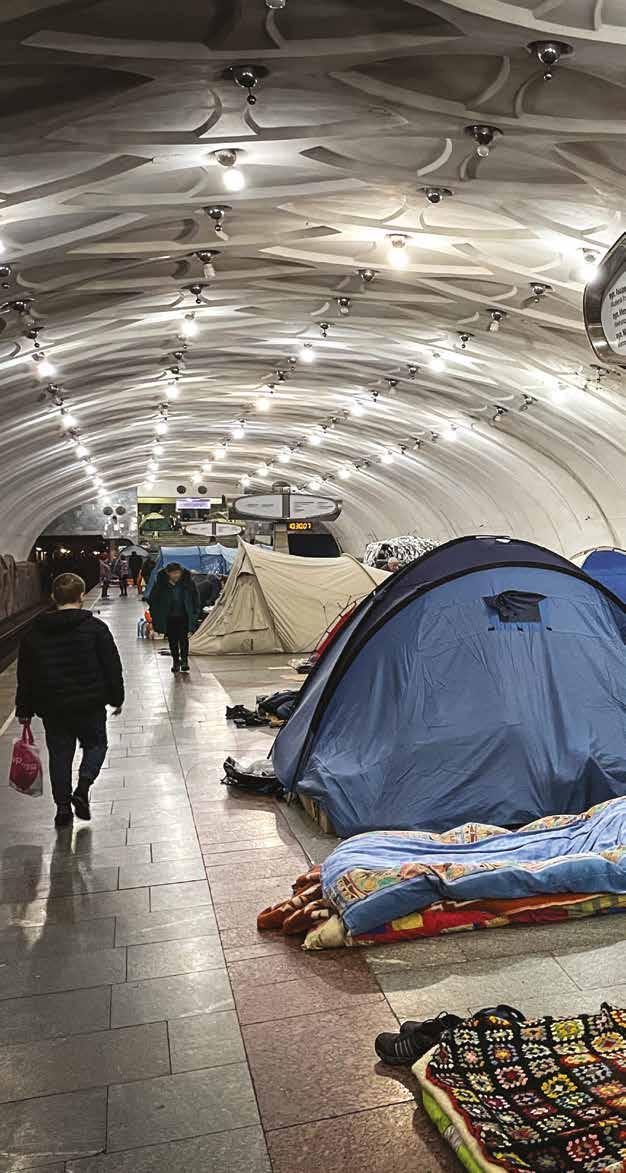 © Mohammad Ghannam/MSF
© Mohammad Ghannam/MSF
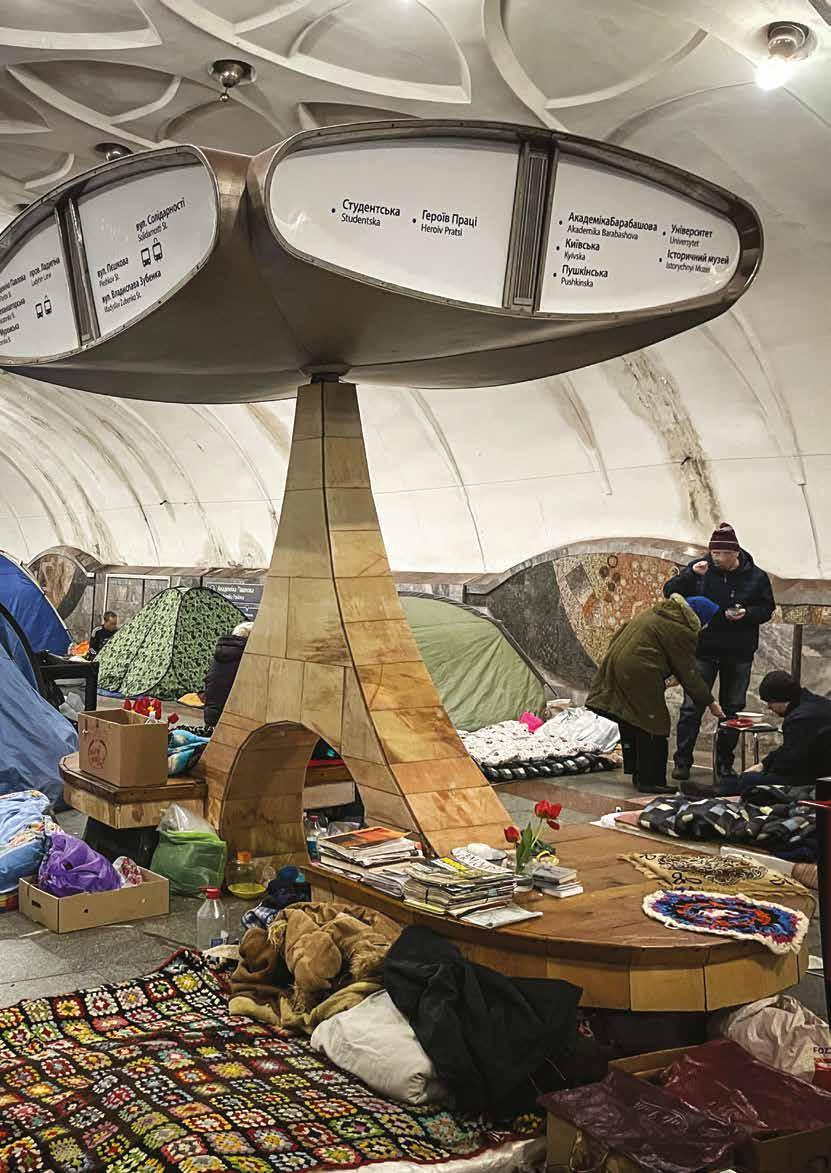
Médecins Sans Frontières Australia
ABN 74 068 758 654
PO Box 847, Broadway NSW 2007, Australia
Phone: +61 2 8570 2600 1300 136 061
Email: office@sydney.msf.org
© 2022 Médecins Sans Frontières Australia www.msf.org.au
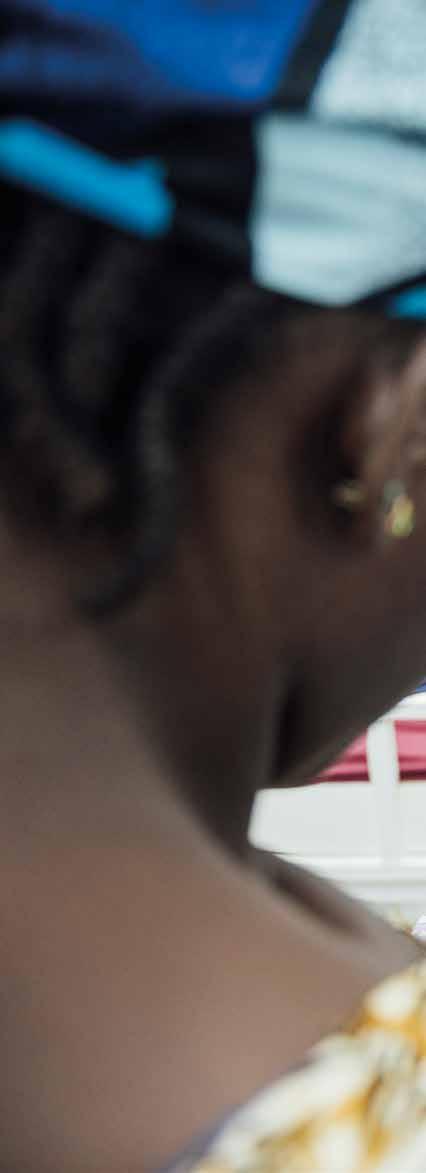
 Médecins Sans Frontières Australia
Médecins Sans Frontières Australia
 © MSF/Manja Leban
© MSF/Manja Leban








 MSF staff walk towards Paukaw township to set up a clinic where they will provide medical and mental healthcare for displaced people in Ah Nau Ywe camp. Myanmar, March 2022. © Ben Small/MSF
MSF staff walk towards Paukaw township to set up a clinic where they will provide medical and mental healthcare for displaced people in Ah Nau Ywe camp. Myanmar, March 2022. © Ben Small/MSF




















 © MSF/SORIYA
© MSF/SORIYA



 Joffrey Monnier/MSF
Joffrey Monnier/MSF


 Guenier/MSF
Guenier/MSF




 © Giles Duley
© Giles Duley







 Children stand in front of the entrance to an MSF mobile clinic in North Kivu province, eastern Democratic Republic of Congo. MSF set up the clinic near where almost 15,000 conflictdisplaced people arrived In July 2022. The front line was just a few miles from the village. © Alexis Huguet
Children stand in front of the entrance to an MSF mobile clinic in North Kivu province, eastern Democratic Republic of Congo. MSF set up the clinic near where almost 15,000 conflictdisplaced people arrived In July 2022. The front line was just a few miles from the village. © Alexis Huguet



 © Mohammad Ghannam/MSF
© Mohammad Ghannam/MSF


































